 12/02/2009 13:27 12/02/2009 13:27 |
|
| | | OFFLINE | | Post: 16.576 | Registrato il: 28/08/2005
| Utente Gold | |
|
OREMUS PRO PONTEFICE NOSTRO
The Holy Father requests the prayers of all the faithful so that the Lord may illumine the road for the Church. May the commitment of Pastors and the faithful grow, in support of the delicate and weighty mission of the Successor of the Apostle Peter as 'the guardian of unity' in the Church.
- Vatican Note, Feb. 4, 2009
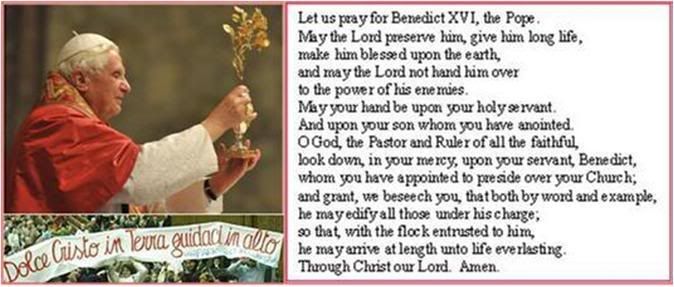
 In reply to a number of messages from new users (as well as a few veteran users but non-members) about the 'difficulty' of navigating within the Forum, I hope this helps:
In reply to a number of messages from new users (as well as a few veteran users but non-members) about the 'difficulty' of navigating within the Forum, I hope this helps:
FOR NEW VISITORS TO THE FORUM: To navigate within the page you are now on, scroll up or down as needed.
To see preceding entries in NEWS ABOUT BENEDICT, Click on 'Previous page', above right.
To get to other topic threads of the English section, click on the 'envelop' above right, tagged 'Fans speaking English' -
it will get you to the board with all the topic threads available in the section.
On that board, to get to the latest page containing the most recent entries on the topic you choose,
click on 'Last' in the parentheses indicating page numbers right after the subject title,
Once you get to that page, proceed as above.
 Pkease see preceding page for initial posts today.
Pkease see preceding page for initial posts today.
Also, the full translation of Mons. Fellay's interview with Famille Chretienne,
in which he speaks about doctinal questions the FSSPX wishes to ckear up with Rome.
 THE HOLY FATHER TELLS JEWISH LEADERS
THE HOLY FATHER TELLS JEWISH LEADERS
HE IS PREPARING TO VISIT ISRAEL
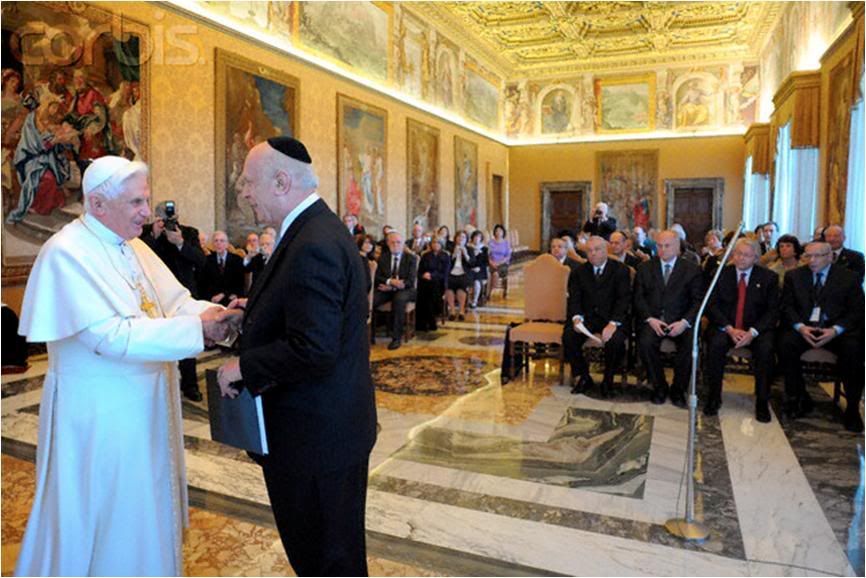 In behalf of the delegation, Rabbi Arthur Schneier, who hosted the Pope at the Park East Synagogue
In behalf of the delegation, Rabbi Arthur Schneier, who hosted the Pope at the Park East Synagogue
in New York City last April, addressed the Pope at the start of today's meeting.
The Holy Father today met with a delegation form the Conference of Presidents of Major American Jewish Organizations, to whom he confirmed he was preparing to visit the Holy Land.
Here is the full text of his address in English.
Dear Friends,
I am pleased to welcome all of you today, and I thank Rabbi Arthur Schneier and Mr Alan Solow for the greetings they have addressed to me on your behalf.
I well recall the various occasions, during my visit to the United States last year, when I was able to meet some of you in Washington D.C. and New York. Rabbi Schneier, you graciously received me at Park East Synagogue just hours before your celebration of Pesah.
Now, I am glad to have this opportunity to offer you hospitality here in my own home. Such meetings as this enable us to demonstrate our respect for one another. I want you to know that you are all most welcome here today in the house of Peter, the home of the Pope.
I look back with gratitude to the various opportunities I have had over many years to spend time in the company of my Jewish friends. My visits to your communities in Washington and New York, though brief, were experiences of fraternal esteem and sincere friendship.
So too was my visit to the Synagogue in Cologne, the first such visit in my Pontificate. It was very moving for me to spend those moments with the Jewish community in the city I know so well, the city which was home to the earliest Jewish settlement in Germany, its roots reaching back to the time of the Roman Empire.
A year later, in May 2006, I visited the extermination camp at Auschwitz-Birkenau. What words can adequately convey that profoundly moving experience?
As I walked through the entrance to that place of horror, the scene of such untold suffering, I meditated on the countless number of prisoners, so many of them Jews, who had trodden that same path into captivity at Auschwitz and in all the other prison camps.
Those children of Abraham, grief-stricken and degraded, had little to sustain them beyond their faith in the God of their fathers, a faith that we Christians share with you, our brothers and sisters. How can we begin to grasp the enormity of what took place in those infamous prisons? The entire human race feels deep shame at the savage brutality shown to your people at that time.
Allow me to recall what I said on that sombre occasion: "The rulers of the Third Reich wanted to crush the entire Jewish people, to cancel it from the register of the peoples of the earth. Thus the words of the Psalm, ‘We are being killed, accounted as sheep for the slaughter’, were fulfilled in a terrifying way."
Our meeting today occurs in the context of your visit to Italy in conjunction with your annual Leadership Mission to Israel. I too am preparing to visit Israel, a land which is holy for Christians as well as Jews, since the roots of our faith are to be found there.
Indeed, the Church draws its sustenance from the root of that good olive tree, the people of Israel, onto which have been grafted the wild olive branches of the Gentiles (cf. Rom 11: 17-24). From the earliest days of Christianity, our identity and every aspect of our life and worship have been intimately bound up with the ancient religion of our fathers in faith.
The two-thousand-year history of the relationship between Judaism and the Church has passed through many different phases, some of them painful to recall. Now that we are able to meet in a spirit of reconciliation, we must not allow past difficulties to hold us back from extending to one another the hand of friendship.
Indeed, what family is there that has not been troubled by tensions of one kind or another? The Second Vatican Council’s Declaration Nostra Aetate marked a milestone in the journey towards reconciliation, and clearly outlined the principles that have governed the Church’s approach to Christian-Jewish relations ever since.
The Church is profoundly and irrevocably committed to reject all anti-Semitism and to continue to build good and lasting relations between our two communities. If there is one particular image which encapsulates this commitment, it is the moment when my beloved predecessor Pope John Paul II stood at the Western Wall in Jerusalem, pleading for God’s forgiveness after all the injustice that the Jewish people have had to suffer.
I now make his prayer my own: "God of our fathers, you chose Abraham and his descendants to bring your Name to the Nations: we are deeply saddened by the behaviour of those who in the course of history have caused these children of yours to suffer, and asking your forgiveness we wish to commit ourselves to genuine brotherhood with the people of the Covenant" (26 March 2000).
The hatred and contempt for men, women and children that was manifested in the Shoah was a crime against God and against humanity. This should be clear to everyone, especially to those standing in the tradition of the Holy Scriptures, according to which every human being is created in the image and likeness of God (Gen 1:26-27).
It is beyond question that any denial or minimization of this terrible crime is intolerable and altogether unacceptable. Recently, in a public audience, I reaffirmed that the Shoah must be "a warning for all against forgetfulness, denial or reductionism, because violence committed against one single human being is violence against all" (January 28, 2009).
This terrible chapter in our history must never be forgotten. Remembrance — it is rightly said — is memoria futuri, a warning to us for the future, and a summons to strive for reconciliation. To remember is to do everything in our power to prevent any recurrence of such a catastrophe within the human family by building bridges of lasting friendship.
It is my fervent prayer that the memory of this appalling crime will strengthen our determination to heal the wounds that for too long have sullied relations between Christians and Jews.
It is my heartfelt desire that the friendship we now enjoy will grow ever stronger, so that the Church’s irrevocable commitment to respectful and harmonious relations with the people of the Covenant will bear fruit in abundance.
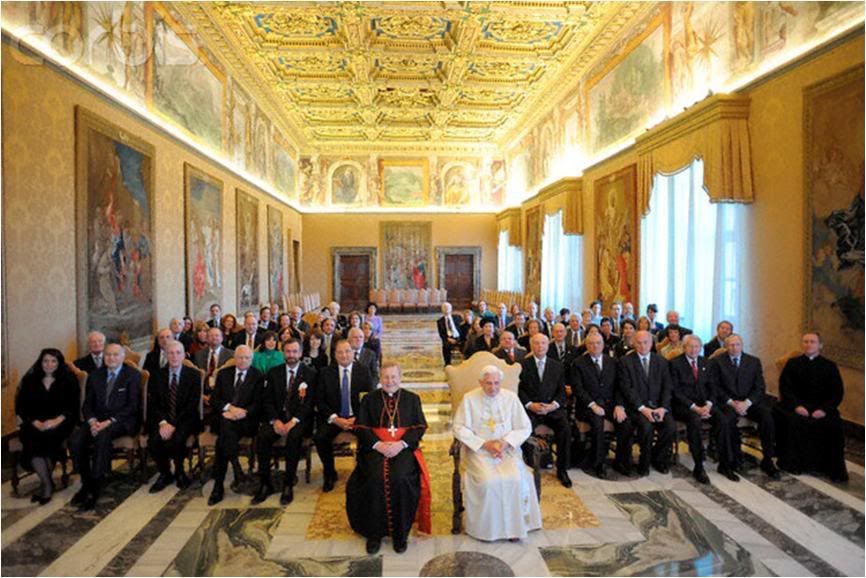 It was a very welcome occasion for the Holy Father to be able to re-state the position of the Church and his own about relations with the Jews and about the Holocaust.
It was a very welcome occasion for the Holy Father to be able to re-state the position of the Church and his own about relations with the Jews and about the Holocaust.
I believe the Jewish organization asked for the meeting. It is clear by now that most Jewish leaders expect the Church and the Holy Father to re-state these well-known positions every chance they have. So be it.
I don't believe the Holy Father has the least bit of false pride not to do so when he can. Yesterday, at the GA, he said something about humility coming to us by being humiliated, and that there is no lack of opportunity for this.
That he responds with his characteristic humility to the now routine humiliation to which most Jewish leaders subject him, at the slightest pretext, is most Christian and sets an example for everyone.
The humiliation is in their injurious remarks againt him, even if they know very well where he stands on the issues they are most sensitive about - not in his re-statement of Church positions about the Jews and a repetition of John Paul's prayer asking God's forgiveness for historical sins committed against the Jewish people by Christians.
To re-state truth in charity is never humiliating.
Jewish leaders welcome
Pope's remarks today
By Rachel Donadio

Published: February 12, 2009
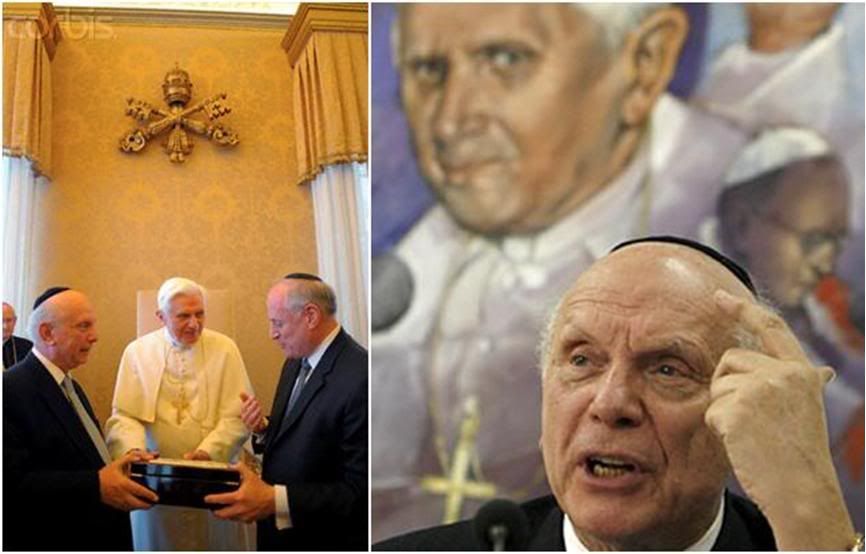 Left photo: Rabbi Schneier and Malcolm Hoenlein (right), vice chairman of the confederation, exchange gifts with the Pope; right photo, Rabbi Schneier speaks at a news confernce held in Vatican Radio headquarters after the Jewish delegation met the Pope.
Left photo: Rabbi Schneier and Malcolm Hoenlein (right), vice chairman of the confederation, exchange gifts with the Pope; right photo, Rabbi Schneier speaks at a news confernce held in Vatican Radio headquarters after the Jewish delegation met the Pope.
VATICAN CITY - Pope Benedict XVI, meeting with Jews in an effort to mend fences after lifting the excommunication of a schismatic bishop who has denied the scale of the Holocaust, said Thursday that the Roman Catholic Church was "profoundly and irrevocably committed" to rejecting anti-Semitism.
He also condemned Holocaust denial as "intolerable and altogether unacceptable," especially to clergy, and said it should "be clear to everyone" that the Holocaust was "a crime against God and humanity."
Addressing 60 members of the Conference of Presidents of Major American Jewish Organizations, an umbrella group, the Pope also said for the first time that he planned to visit Israel. The Vatican has not yet officially announced the trip, but sources there said it was expected to happen in May.
Many in the delegation responded positively. Rabbi Arthur Schneier, who addressed the pope at the audience Thursday, called Benedict's remarks "a wonderful step in terms of healing a tremendous strain."
The remarks were the Pope's latest, and among the strongest, in a series of statements since he provoked global outrage by rehabilitating a bishop who was excommunicated in 1988 for being consecrated by the St. Pius X Society.
The society was founded as a rejection of the reforms of the Second Vatican Council, which included a measure that absolved contemporary Jews of responsibility for the death of Jesus Christ.
The bishop, Richard Williamson, said in an interview broadcast last month that the Nazi gas chambers never existed and that the number of Jews killed in the Holocaust numbered only several hundred thousand.
Benedict has said that he removed the excommunications of four bishops as a gesture of "compassion" to help heal the only formal schism in the Church, and Vatican officials asserted that he was unaware of the bishop's stance on the Holocaust. The Vatican has now said that Williamson must renounce his remarks before he can serve as a clergyman.
In his remarks Thursday, Benedict reaffirmed the church's commitment to Nostra Aetate, the Vatican II document that absolved the Jews of killing Christ, calling it "a milestone in the journey toward reconciliation" between Catholics and Jews.
Rabbi David Rosen, the American Jewish Committee's international director of inter-religious affairs, said that for him the matter was now closed.
"I don't think there's anything more to ask of the Vatican concerning this episode, other than to see how negotiations with the St. Pius X Society move ahead, or not," he said.
But Abraham Foxman, national director of the Anti-Defamation League, who also attended the audience, said he had hoped the Pope would go even further and excommunicate Williamson again. [Oh, I just knew Foxman would throw a skunk into the pen. This man is insatiable! I almost feel one should start a Rosary crusade or a novena to the Holy Spirit for him and others like hinm, to just open their minds a bit and let some fresh air in.]
"You can't condemn anti-Semitism and Holocaust denial and then reinstate someone who's a Holocaust denier," Foxman said. He called the Pope's statements "significant and very important," but said they "did not bring closure." {Shut up, you nasty man!]
Following the global outcry over Williamson's remarks, in recent weeks the Vatican has said that the members of the St. Pius X Society will have to accept the teachings of Vatican II in order to return to full communion with the Church. Earlier this week, the bishop was removed as the head of his seminary in Argentina.
The Vatican spokesman, the Reverend Federico Lombardi, on Thursday called the process by which the four bishops might be brought back to the Church "a path that can now begin."
Rabbi Rosen says he considers
FSSPX 'incident' closed,
but not the ADL's Foxman
 I thought AP would file a story using this report from its Italian subsidiary, especially since two prominent Anglophone Jewish leaders are involved. But I see I have to go ahead and translate.
I thought AP would file a story using this report from its Italian subsidiary, especially since two prominent Anglophone Jewish leaders are involved. But I see I have to go ahead and translate.
Not that I think any of these statements are significant in themselves - they will quickly change at the next hint of any pretext that they can exploit against the Pope and the Church. Pardon my cynicism.
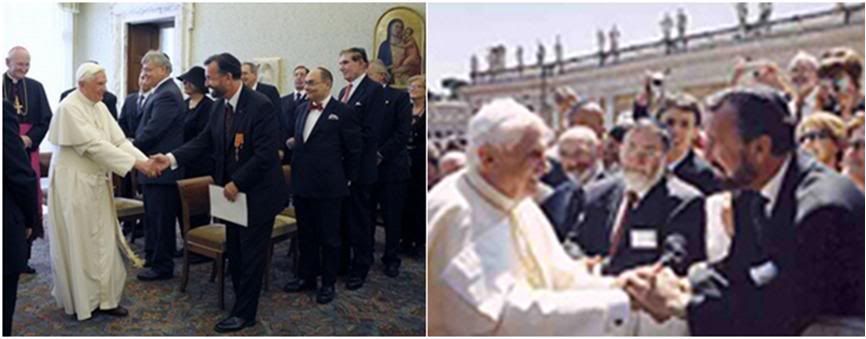 Rosen has met the Pope on quite a few occasions in the past 4 years.
Rosen has met the Pope on quite a few occasions in the past 4 years.
VARICAN CITY, Febr. 12 (Translated from Apcom) - The Williamson incident is 'closed', and now the way is open for new progress in relations between the Jews and the Church, according to Rabbi David Rosen.
A leading figure in the Jewish-Catholic dialog, adviser to the Grand Rabbinate of Israel, and president of the International Committee for Inter-Religious Affair of the Amereican Jewish Committee (AJC), Rosen had been among the most vociferous critics of the Pope Benedict XVI for having revoked the excommunication of four bishops including Holocaust denier Richard Williamson.
"The whole episode caused a lot of damage to Jewish-Catholic relaitons and to the Church itself, but it also brought some good, because in the end, wee have strengthened our relations", Rosen said at a news conference after the Pope met with presidents of Amerticna Jewish organizations this morning.
"I would have preferred that it had not happened, but it was good for having had some healthy effects. The Vatican itself will be more rigorous on the matter of admitting the FSSPX into the Catholic Church, and I think nothing will be done under the table, and that the process will be transparent and responsible. I think we will see serious conflicts within that organization", he said. [Excuse me, that's a whole bunch of uncalled-for assumptions and comments about completely internal affairs within the Church! What self=respecting independent organization would stand for such presumptuousness from outsiders?
How would Rosen react if Cardinal Kasper expressed himself to all and sundry about how the AJC chooses its members, or demands that the Grand Rabbinate of Israel open its meetings about problem Jewish sects to the rest of the world? He would think the Cardinal had gone out of his mind to even think of such things.
And yet, Jews like him are saying the same - lashed with liberal doses of insults - almost reflexively and quite frequently of the Pope and the Church!]
Cardinal Tarcisio Bertone, Vatican secretary of state, had reacted to Rosen's earlier statements about the FSSPX case by saying he found it 'abnormal' that 'his friend' Rosen had opted to "always critize the Pope".
"I am not frightened by the possibility that friends criticize each other," sasid Rosen, but he pointed out that he had direct dealings with Cardinal Walter Kasper, the president of the Vatican commission for religious relations with Judaism,, not with Cardinal Bertone.
During the news conference, Rosen also clarified that "there was never a break nor a rupture" in the relations between the Grand Rabbinate of Israel and the Holy See, as reported in the media.
"However, until the situation had been cleared up, it was decided to postpone a meeting scheduled for the start of March at the Vatican," he continued.
"Now that the question has been resolved, we will proceed with the meeting, probably in mid-March, one or two weeks later than originally scheduled. On thjat occasion, I hope will be able to meet Cardinal Bertone as well."
About the Pope's planned visit to Israel, Rosen recalled that during the brief conversations this morning with the Pope, Benedict XVI had said, "I hope my trip to the Holy Land will be a sign of peace".
I thought the following information about Rosen may be relevant:
In Nov. 2008, Rosen became the first Orthodox rabbi to receive a papal Knighthood, conferred on him for his contribution to Jewish-Catholic reconciliation. In the name of the Pope, Cardinal Kasper conducted the investiture that made Rosen a Knight Commander of the Pontifical Order of St. Gregory the Great.
Rosen considers this honor important enough to mention it in the brief introduction about him on the home page of his website.
Last October, Rosen was the only major Jewish leader who sounded moderate on the Pius XII issue, which was a pleasant surprise. But then when the Williamson case came along, his statements were among the harshest, with much of the vitriol directed at Pope Benedict.
Yet, when Cardinal Ratzinger was elected Pope in 2005, Rosen said on Isareli TV: "In all matters of anti-Semitism, Ratzinger, now Pope Benedict, has been absolutely resolute in his understanding of the evil and the danger and in condemnation of this phenomenon”.
At the time, he dismissed so-called 'concerns' about Ratzinger's mandatory enrolment in the Hitler Youth, which was played up in Israel's alrgest newspaper with the headline "White smoke, black past'.
The Cardinal Ratzinger he praised so highly "in all matters of anti-Semitism" is the same Benedict XVI who lifted the excommunication from the FSSPX bishops - yet Rosen had no problem making it appear as if the Pope was now the world's leading anti-Semite, or at the very least, the most insensitive to Jews!
I don't know what electoral constituency Rosen is playing to, but everything he now says is resoundingly hollow.
[Modificato da TERESA BENEDETTA 16/02/2009 03:12] |
|
 12/02/2009 15:41 12/02/2009 15:41 |
|
| | | OFFLINE | Post: 3.571 | Registrato il: 23/11/2005
| Utente Master | |
|
It will be interesting to see what the secular media make of today's meeting between the pope and the American Jewish delegation. I'm predicting next to nothing will be said about it but here is what was printed in America Magazine, a usually liberal Jesuit publication in the US.
Benedict's Meeting with Jewish Leaders
AUTHOR: MICHAEL SEAN WINTERS
America Magazine
POSTED AT: 2009-02-12 08:52:00.0
Pope Benedict XVI met this morning at the Vatican with a delegation from the Conference of Presidents of Major Jewish Organizations. In the wake of his decision to lift the formal excommunications of four Lefebvrist bishops, one of whom has denied the Holocaust, it was important that Benedict hit the right note. As is often the case, the Holy Father played an entire symphony of right notes.
Benedict began by recalling the memory of happy meetings with rabbis and other Jewish leaders during his visit last year to the United States and on his first papal visit to Cologne. He recalled, too, his visit to Auschwitz-Birkenau, and the horror of that place and the crimes committed there: He had made the somber pilgrimage, a pilgrimage that leaves no human heart untouched by the deepest pangs of shame, pain, and fright. These recollections amounted to an invitation to see the present controversy in the context of a relationship that is greater than one miscalculation. These men of faith know each other and respect each other and each others’ history, and no one should be rushing to judgment against one another.
Secondly, the Holy Father beautifully recalled that the roots of Christianity are inextricably intertwined with Judaism. "Indeed, the Church draws its sustenance from the root of that good olive tree, the people of Israel, onto which have been grafted the wild olive branches of the Gentiles (cf. Rom 11: 17-24). From the earliest days of Christianity, our identity and every aspect of our life and worship have been intimately bound up with the ancient religion of our fathers in faith." He did not explicitly say it, and I do not think Pope Benedict is inclined to speak in psychological terms, but these words of his suggest that a Christian anti-Semite is in some sense filled with self-hatred, which is always the most pernicious hatred to root out because its roots are so mired in unreasonableness.
Finally, the Pope said that the Shoah must continue to animate our memories because threats to human dignity persist. It is not enough to remember in a passive way. Memory must serve as a warning to the future. This most central theme of contemporary Jewish life and identity has special poignancy coming from any Catholic Pontiff, but especially from one born in Germany, as it did coming from a Pope born not far from Auschwitz. Benedict recalled Pope John Paul’s visit to the Western Wall in Jerusalem and made his own his prayer for forgiveness for all the crimes perpetrated against God’s chosen people through the centuries.
In the life of faith, great advancements do not usually come from an entirely new source so much as they do from a new way of looking at an ancient source. Thus did the Second Vatican Council renew the Church by reaching back to the Patristic theology of the early centuries of the Church. Thus does the Shoah become not a historical shame but a current reality, animating us to a deeper respect and love for our Jewish brothers and sisters and a greater awareness of the threats to human dignity that plague us still.
Many years ago, the most learned priest I know, Father J. Augustine DiNoia, OP, was preaching at the Cathedral of St. Matthew on Good Friday. The readings of that day include the great Ur-text of anti-Semitism when the Gospel of John reports that the Jewish elders of the day said of Jesus, "Let his blood be upon us and upon our children." Father DiNoia did not focus on the ways that the blood libel against the Jews contradicted other principles of Christian morality. He pointed out that, of course, we want that blood on us and upon our children for we believe that it is Jesus’ blood that brings redemption. Suddenly, the potential of this Gospel text to invite anti-Semitism was erased, replaced with a challenge to us Catholics to rethink the long, and often criminal, ways we have treated Jews. The Pope did something similar in his meeting today, using the recent controversy to renew his commitment, and that of the Church, not only to dialogue with Jewish leaders, but to a profound love of our elder brothers in faith, the chosen people, Israel.
*********************************************************************
Here's how the AP reported it - and somehow I think this would be typical of how the secular media are reporting on it: as brief and perfunctory as they can [Can you believe 4 sentences? That's what the AP report is!], if they can pick out nothing controversial or negative to say about the Pope.
I bet if the Williamsonc ase hadn't been a precedent, the address would never have been reported - because it doesn't mention Pius XII or the Good Friday prayer, the other flash points media is only to ready to light the fuse on.
Pope Benedict XVI:
Holocaust denial unacceptable
VATICAN CITY, Feb. 12 (AP) – Pope Benedict XVI has told Jewish leaders that any denial of the Holocaust is intolerable and unacceptable, especially if a priest does it.
Benedict said during a meeting Thursday at the Vatican with about 60 American Jewish leaders that he is preparing to visit Israel.
The audience was scheduled after Benedict lifted the excommunication of a traditionalist bishop who denied the Holocaust, sparking outrage among Catholics and Jews alike.
The German-born Benedict issued his strongest condemnation yet of Holocaust denial during the meeting. He called the Holocaust a crime against humanity and affirmed the Catholic Church was "profoundly and irrevocably committed to reject all anti-Semitism."
*********************************************************************
I must go on and comment. Hope you don't mind, Benefan. You know me too much by now:
More and more I am starting to detest news reporting about the Pope's major statements, which usually rob it of all character.
I still say that for a person like the Pope who develops his thoughts so organically, it is a crime to chop up what he says because then one fails to show his thought flow, which is sometimes more important than bare statements taken out of context.
I particularly resent the usual exercise straight out of Journalism-101 (but a poor application of it) of trying to quote the 'meatiest' lines of the address or text by the simple expedient of adding phrases like :"The Pope said..., "Then he added..., "He also said..." and the like.
It's stultifying - and sets my teeth on edge! But sad to say, almost everyone does it, starting with VIS, Zenit and AsiaNews.
If you must 'edit' the Pope's text, then pick out the best or most significant parts, put ellipsis where you choose to omit some lines or paragraphs, but at least present the thoughts altogether and consecutively, not jumbled according to the reporter's convenience, and place quotation marks on the entire excerpt. That's infinitely more professional, and more useful to the readere.
And of course, nothing beats printing the full text of the main message itself (omitting just the preliminary and ending courtesies, if you're doing it for print media).
And when it is a catechesis, just print the whole text - a catechesis is not meant to be taken in sound bites. It's a self-contained lesson unit.
TERESA
[Modificato da TERESA BENEDETTA 12/02/2009 18:40] |
 12/02/2009 18:30 12/02/2009 18:30 |
|
| | | OFFLINE | Post: 3.573 | Registrato il: 23/11/2005
| Utente Master | |
|
The papal provocateur
Father Raymond J. De Souza
National Post (Canada)
Posted: February 12, 2009
For the last three weeks, everyone from the papal spokesman to the tawdriest German tabloid has taken shots at the Vatican’s mishandling of reconciliation efforts with breakaway traditionalist Catholics in the Society of Saint Pius X (SSPX). The Holocaust denial of Bishop Richard Williamson, one of the four bishops whose excommunication was lifted for reasons unrelated to his unsustainable historical views, made for an international uproar and understandable expressions of pain and anger from many Jewish groups.
No doubt Pope Benedict XVI has had some harsh words for his advisers, who let him down badly in the handling of this episode. [ I doubt it.] Yet three weeks out, the Holy Father can take satisfaction in how this will be resolved. Today in Rome he will grant a special audience to American Jewish leaders, and address them about the Shoah. Meetings hastily cancelled by the chief rabbinate of Israel are back on, plans are proceeding for a papal visit to Israel in May, the German Chancellor who publicly rebuked Benedict has now acknowledged what everyone knows, that the pope is a friend of the Jewish people and does not endorse Holocaust denial.
Even more extraordinary, the breakaway group to which Bishop Williamson belongs, the Society of Saint Pius X (SSPX), has moved publicly and decisively to distance itself from anti-Semitism (a long-standing problem in far-right French culture). More remarkable still, the SSPX first silenced Williamson, and then relieved him of his duties as rector of their Argentine seminary.
The breach in Catholic-Jewish relations is quickly mending and more change has been wrought in the SSPX on matters related to Jews in the last three weeks than in the last three decades. The cunning plan of a master strategist? Not likely this time; mistakes are mistakes. But the Williamson imbroglio does point to a distinctive feature in the style of Benedict XVI.
Since he arrived in Rome more than 25 years ago, Cardinal Joseph Ratzinger has repeatedly and deliberately been provocative, kicking up enormous media storms on sensitive subjects. His calculated risk is that his interventions will not move the debate one way or the other within the given parameters, but change the parameters of debate altogether.
He is willing to play with fire in order to bring both heat and light; the obvious danger is that on occasion the fire scorches the Vatican itself.
We first saw this clearly in his 1985 interview book The Ratzinger Report. Commenting 20 years after Vatican II, Cardinal Ratzinger deliberately used the word “restoration” to speak about what was necessary to correct post-conciliar abuses. It sparked a fevered debate in the Church and earned criticism from other bishops, but his remarks framed the debate for the synod of bishops that year — the synod which called forth Ratzinger’s single most important work, the Catechism of the Catholic Church.
The Catechism itself is the perfect Ratzingerian provocation. After 20 years of fighting a rearguard action against heterodox catechetical materials, Pope John Paul II and Ratzinger shifted the debated entirely. They produced their own, authoritative catechism, which 15 years on, has utterly changed Catholic catechetics the world over. The theological dissenters denounced and opposed the project at every turn, predicting it would never be finished. That one forgets those debates now is an indication of how thoroughly they were routed by Ratzinger’s signal project.
Fifteen years later, during the Great Jubilee of 2000, Ratzinger published Dominus Iesus, and used the words “gravely deficient” and “defects” to describe the situation of those outside of full communion with the Catholic Church. That firestorm required Pope John Paul II himself to publicly defend the document; this time there was public criticism even from senior Vatican officials. Yet again, Ratzinger’s intervention reshaped the debate, making it absolutely clear that genuine ecumenism cannot mean relativism or indifferentism.
In 2005, just weeks before John Paul’s death, Cardinal Ratzinger wrote the meditations for the papal Via Crucis at the Colosseum. Writing of the Church, he wrote of the “filth” in the priesthood, and that the ship of faith was “taking on water from all sides.” It too made international headlines and remains today the most memorable and dramatic condemnation of priestly sexual abuse. Last year on his American visit, Benedict spoke repeatedly about sex abuse and met personally with victims, again changing the tone and substance of that crisis.
At the funeral Mass of John Paul, it was Ratzinger who moved the world to tears with the evocative image of the Holy Father standing at the window of the house of the Father. A few days later, on the threshold of the conclave, Ratzinger used the phrase “dictatorship of relativism,” which instantly made the front pages of every newspaper in the world, and framed the challenge facing the Church in electing a new pope.
Then there was Regensburg, where, in 2006, the Holy Father raised in an indirect but unmistakable fashion the question of the status of violence within Islam. The rioting and anti-Christian violence which followed sent Benedict and the Vatican into the fence-mending operations we have seen again these last weeks. Yet Regensburg was a historic turning point — for the first time Catholics and Muslims met last year at the Vatican for theological dialogue. A frank challenge was met with a breakthrough response. Another debate he entered in order to change it.
Benedict is a quiet, even shy man. But he is not timid or naive. He is not afraid to bring the fire, even if, as was the case this month, it means that those gentle, classical pianist’s fingers might get burnt.
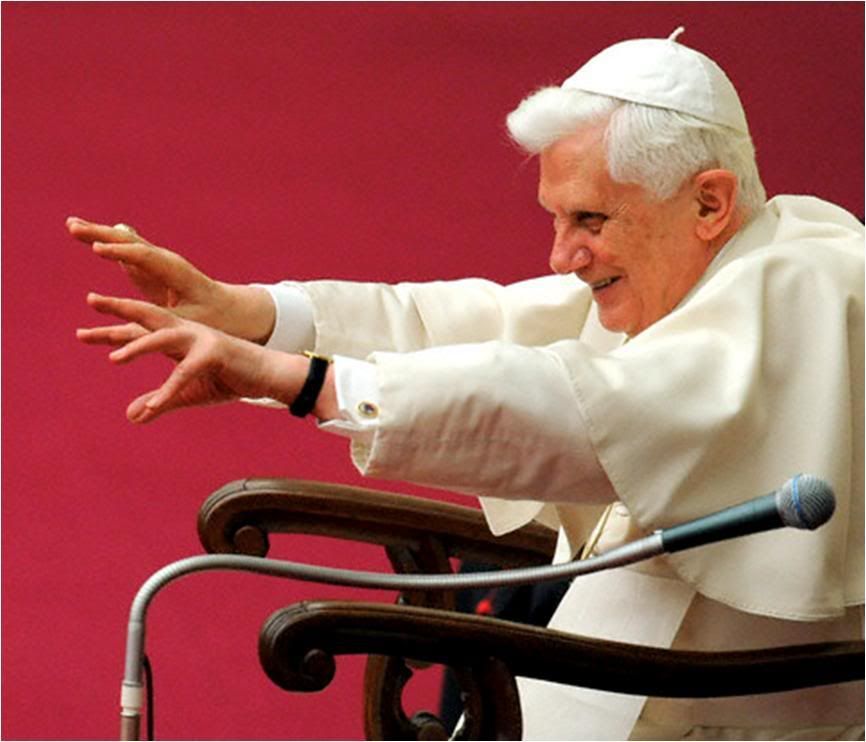 THE JOYOUS 'VICTIM': The Holy Father at the General Audience on 2/11/09.
Fr. De Souza, as usual does a great job of 'accentuating the positive', as Cole Porter would say. I am especially grateful for the writer priests who are Benaddicts in their own way as we are. God bless them, and may their tribe increase. (Can't wait for Fr. Schall to weighh in on all this!)
THE JOYOUS 'VICTIM': The Holy Father at the General Audience on 2/11/09.
Fr. De Souza, as usual does a great job of 'accentuating the positive', as Cole Porter would say. I am especially grateful for the writer priests who are Benaddicts in their own way as we are. God bless them, and may their tribe increase. (Can't wait for Fr. Schall to weighh in on all this!)
Of course, Fr. De Souza's 'papal provocateur' viewpoint puts him up diametrically opposite the Jeff Israely-John Allen knuckle-rapping school who see only gaffes and maladroitness by Benedict himself whenever the Pope is skewered and roasted in the media's polemique-du-jour.
It's particularly very useful that he came out with a list of the major steps Joseph Ratzinger/Benedict XVI has taken to defend and promote the faith. Though I am surprised he failed to mention Summorum Pontificum, which, apart from its profound intrinsic significance, was also the necessary curtain-raiser to the excom recall.
Come to think of it, it's a measure of the apparent triumph of the progressivists in the Church post-Vatican II that Mons. Lefebvre, in 1988, saw fit to renege on an agreement he had signed with Cardinal Raztinger - allegedly because of last-minute 'mistrust' of the Curia.
Yet in 1988, the Ratzinger Report was barely three years old, and it had indirectly led to the 1985 Special Bishops' Synod called by John Paul II to place Vatican-II in the right perspective, giving birth to the Catechism of 2000 [despite the open cynicism among the progressivist bishops in the Synod that it would never see the light of day!].
It seems Mons. Lefebvre had little faith that the enlightened yet Tradition-conscious orthodoxy of someone like Cardinal Ratzinger at the time would have any force to buck the prevailing culture.
I hope that from where he is, the old archbishop finally has reason to see that Benedict XVI has been able to carry on the fight against non-imaginary windmills (even if they have been powered by all the hot air generated by a false 'spirit of the Council').
Apropos, I wonder why the progressivists have been fighting all along in the name of this false 'spirit of the Council'. Surely it is not their modesty that has kept them from saying that their vaunted 'spirit' is none other than the Holy Spirit.
Because the true Spirit of the Council is the Holy Spirit, and I suppose they want to be careful not to break the first Commandment. In fact, of course, the 'spirit of the Council' they invoke is really 'the spirit of the times', literally Zeitgeist, as the German term has it - than which nothing is more capricious, fleeting and unworthy of trust.
TERESA
P.S. One of the points that came to mind as I read Fr. de Souza's piece was to express some reservation over the idea that Joseph Ratzinger/Benedict XVI consciously sets out to be a provocateur. Not that Fr. De Souza says so.
But JR/B16 'provokes' whenever he decides to present the truth as he sees it, as the perennial universal Church sees it, or when he exercises a papal prerogative in fulfillment of his primary functions as Pope (preserving and defending the deposit of faith, in the case of Summorum Pontificum; re-stating the Church's core beliefs, in the case of the reformulated Good Friday prayer for the Jews; and looking after stray sheep, in the case of his initiatives with the FSSPX).
What a great time to be Catholic in the era of Benedict XVI!
[Modificato da TERESA BENEDETTA 12/02/2009 21:16] |
 12/02/2009 20:05 12/02/2009 20:05 |
|
| | | OFFLINE | | Post: 16.577 | Registrato il: 28/08/2005
| Utente Gold | |
|
 Defending Pope Benedict XVI
Defending Pope Benedict XVI
by Selwyn Duke

Published February 12, 2009
Selwyn Duke is a writer with conservative views who wrties widely for conservative outlets. but Blog Critics (BG) is apparently an open online journal. It's too bad commentary like this isn't found enough in the mainsrteam media.
Pope Benedict XVI has found himself in a maelstrom of controversy over his lifting of the excommunication of Richard Williamson, an illegally consecrated prelate who has downplayed the magnitude of the Holocaust. The Pope has been scored by the media, certain Jewish groups, and even some fellow Catholics; yet few truly understand what they’re criticizing. Let’s examine the matter.
There is no question that Williamson has made some outrageous statements. For instance, first we have the Holocaust comment that put him on the radar screen: “I think the most serious conclude that between 200,000 to 300,000 perished in Nazi concentration camps, but not one of them by gassing in a gas chamber. I believe that the historical evidence is strongly against 6 million Jews having been gassed in gas chambers as a deliberate policy of Adolf Hitler.”
This is not the only time Williamson raised eyebrows. He also believes the U.S. government perpetrated 9/11 to provide a pretext for invading Afghanistan and Iraq and once said, “the Vatican has sold its soul to liberalism.”
Thus, it’s understandable that he would grab headlines. Yet, in the media’s rush to disseminate what they fancy to be the Vatican’s sins, they render themselves guilty of a mortal one of journalistic omission.
First, while the reportage can leave one with the impression that Williamson is a Catholic bishop, this is not the case. Rather, he is a bishop in the Society of Saint Pius X (SSPX), a schismatic organization that is not in union with the Church. To understand the situation adequately, some background is necessary.
The SSPX is a group of ultra-traditionalist Catholics created by the late French Archbishop Marcel Lefebvre in 1970. The organization objected to the reforms of the Second Vatican Council (1962-1965), some of which it perceived to be heretical in nature. As time wore on, Lefebvre’s bucking of the establishment caused increasing friction between the society and its philosophical opponents and the Vatican.
As Lefebvre aged, he became concerned that his society might not be under the stewardship of like-minded traditionalists upon his death; thus, he consecrated four SSPX priests — one of whom was Richard Williamson — as bishops, in defiance of Pope John Paul II.
The Pope then enforced Church law and announced that Lefebvre and the four priests had incurred excommunication. In other words, Williamson was never actually a bishop because he was invalidly consecrated by a renegade archbishop.
This is important to understand when reading articles in which ignorant, if not anti-Catholic reporters write about the “rehabilitation” of the four “bishops.”
At this juncture, the rehabilitation of the men doesn’t involve making them officers of the Church with official functions; it simply refers to the lifting of their excommunications. Moreover, the Vatican has made clear that Williamson will never be able to assume ecclesiastical duties unless he completely renounces his claims regarding the Holocaust.
Yet critics are still incensed. “Why would the Pope lift the excommunication of a man holding such outrageous views?” they ask. Others, such as Einar Koch writing at Bild.com, are befuddled. He wonders, “...does the Vatican really know the extent of Williamson's outrageous beliefs?” (Note: It has now been revealed that the Pope did not know.)
While that is a fair question, this is nevertheless where I lose a bit of patience. I would have to ask Koch and the rest of the media, “Do you really know to any extent what you’re caterwauling about?” For while the secular world talks sanctimoniously about how the Church has to work toward “understanding,” it seems to forget that understanding must go both ways.
I can sum up the Church’s critics’ position very simply: A bad man said some bad things, and lifting an excommunication is a good thing to do for someone. And only a bad man would do a good thing for a bad man. This little Dick-and-Jane explanation seems simplistic, but it’s accurate, as most of the critics are long on didacticism but short on depth.
In reality, they’re acting like a lynch mob angry that the authorities aren’t meting out its version of justice. This isn’t surprising coming from people who seem to believe that, oh, for instance, a legislative body can ignore constitutional dictates and do whatever its majority decides. But the Church is governed by laws [its own laws, which do not necessarily drawn according to civilian law!] not whims. I’ll illustrate the point with an analogy.
Imagine that the death penalty is administered for the murder of a child. Now let’s say a man commits this crime and is thus sentenced. Subsequently, however, exculpatory evidence is presented and the man is pardoned.
All right, now imagine it comes to light that the man made some vile anti-Catholic statements, and outraged Catholics demand that the sentence be carried out anyway. Would this be reasonable? Besides the fact that such a punishment would be disproportionate, I think the secular world’s reply would be that its law isn’t there to do the Church’s bidding.
While this analogy isn’t perfect, it does roughly illustrate the situation. And if this seems a stretch, consider that excommunication has been called a spiritual death sentence.
It is the harshest [canonical] penalty the Church imposes and, like capital punishment, is only applied for specific transgressions. It is not imposed simply for making outrageous or offensive comments [nor even for committing the most outrageous crimes]; if it were, it’s staggering to think how many Catholics might suffer this fate.
Thus, excommunication exists for a particular reason, one that has nothing to do with augmenting the wider society’s scorn and ostracism. And besides the fact that it would be disproportionate to that purpose, Church law isn’t there to do the secular world’s bidding.
It might also be pointed out that the secular world could lead by example. If it really believes that something beyond scorn is warranted as a consequence for Williamson, it could advocate criminal penalties. This is what they do in Germany, after all, where historian David Irving did a stretch in prison for Holocaust revisionism.
Oh, but we don’t want to stifle freedom of speech by imposing our harsher punishments on those with errant tongues? Well, perhaps it’s now easier to understand why the Church may not impose its harshest penalty for such a thing.
At the end of the day, however, this issue boils down to one simple fact: Williamson’s excommunication had nothing to do with his views on the Holocaust, and the remission of it had nothing to do with them. It is ridiculous to conflate the two.
It’s also important to understand that the rehabilitation of the four bishops is part of a much larger process, an attempt to heal divisions in the Church and bring the SSPX back into the fold. Insofar as this goes, it’s much like when a government offers to pardon a rebel group if its members will lay down their arms.
Under such an agreement, it certainly isn’t customary to say that you will exclude this or that member because he made a highly outrageous statement. No, he comes with the organization - it’s a package deal.
Really, though, one has to wonder why this story still has legs. The Vatican has repudiated Williamson’s comments, and the Pope has stated on numerous occasions that denial of the Holocaust’s horrors is gravely wrong.
Moreover, as Rabbi David Dalin has said, and contrary to leftist spin, the Church has long been a friend of the Jews - since at least the 13th century.
So what is really going on? Why would a left wing and somewhat anti-Semitic media suddenly have such concern for a Jewish cause? Well, there is of course the media’s infamous, ideologically driven anti-Catholic bias. Yet, to fully understand the current attack, one must understand that this Pope is the embodiment of everything the left despises.
Although the terminology doesn’t really apply in Catholic circles, Pope Benedict XVI is seen as being a rightist (the relevant terms in Catholicism are not right and left but orthodox and heterodox). He has done much to restore tradition to the Church, and this has won him many enemies within her and without.
Why do you think the one man who has called for the Pope’s resignation is an obscure liberal German “theologian” named Hermann Haring? Despite liberals’ talk of tolerance and inclusiveness, they aren’t exactly big-tent people (except when election time comes; then their tent expands to include even cemeteries and mausoleums).
For instance, consider how the Democrats once refused to let fellow party member and then-Pennsylvania governor Robert Casey speak at the Democrat National Convention because he was pro-life, or how conservative professors and actors may be denied, respectively, tenure or roles.
In this case, these scheming leftists simply don’t want an orthodox Pope at the helm of the Church, especially one who might invite traditionalists like the SSPX into their midst. Thus, they would like to be rid of him, just as they would like to eliminate talk radio and the Boy Scouts.
At the end of the day, those in the media don’t understand the Williamson issue, and they don’t really care. This is because the prolonged attack on the Pope has about as much to do with Holocaust denial as the Fairness Doctrine has to do with fairness.
*********************************************************************
[For those who don't follow US news, the Fairness Doctrine is a ridiculous law the Democrats would like to revive demanding that radioa nd TV stations give equal time to 'conservative' and 'liberal' talk shows.
This naked attack on the free-market competition of ideas and products by so-called 'liberal' politicians is prompted by the phenomenon that conservative talk-radio hosts command large audeinces and enormous influence in the United States, where all attempts by liberals to match the phenomenon by fielding their own commentatorss have thus far failed miserably - very simply, they have failed to attract enough audiences in order to attract enough advertisers that could keep any show viable. This is a negative phenomenon that the left has been unable to account for.
Since they can't win on the free market, they are now going to compel radio stations to provide equal time to their commentators even if they can't get advertisers that are a private business's only objective gauge of whether they can afford to go on airing a program.]
Better class of Bishops in Bavaria:
But what took them so long?
 shares this translation of an item
shares this translation of an item
from Cologne Cathedral's radio news service.
An attempt to redress:
Bavarian bishops express
solidarity with the Pope

February 12, 2009
The Bavarian bishops have given Pope Benedict XV their support in a letter. Given the "distorted discussion" about the Church and also the office and person of the Pope, it was urgent to show their "inalienable solidarity," said the chairman of the Freising Episcopal Conference, Archbishop Reinhard Marx of Munich, writing on behalf of the bishops.
The letter continues: "We are and will make every attempt to oppose with all our force any attempt to damage the Catholic Church and you, as our Holy Father with ambiguous and confusing statements which approximate to anti-Semitism." The attitude and utterances of the Pope were clear and unambiguous.
In their dioceses, the bishops had all made efforts, "to correct the in-part very misleading statements in the media and to contribute to a factual discussion." They will continue to try their best, the letter continues.
And about the Pope: "We know that you possess spiritual depth and theological competence which you direct towards the unity of the Church, and towards those who will not take your outstretched hands."
The Freising Episcopal Conference, in addition to the seven Bavarian dioceses and the Diocese of Speyer, support with the Pope the clear orientation in the Second Vatican Council, according to the letter.
With Benedict XVI, the bishops underscored, people who can only be Catholic fully accept this continuity and acknowledge the teaching authority of the Popes and the Councils. At the same time, they called for prayers for the Head of the Catholic Church.
NB: Since I found it strange that the news should come from Cologne which is not in Bavaria, I checked back - and I see that the original news release, exactly as translated above, was issued by the Archdiocese of Munich and Freising. It's also the first and only news item on the site about the FFSPX hullaballoo.
And from the Spanish bishops' conference:
Spanish bishops send letter
of support to Pope Benedict
Translated from

Madrid, February 12, 2009
The Spanish bishops' conference (CEE), through its Executive Committtee, meeting today, Thursday, in Madrid, has sent a letter of support to Pope Benedict XVI, expressing "its feelings of close communion and sincere affection" during a time when voices have been raised casting doubt on his love for the Jewish people, and more concretely, his firm rejection of every form of anti-Semitism.
"We know very well the interst that Your Holiness has had for many years, and in particular, in the exercise of your Petrine ministry, in dialog with our brothers of the People of the First Alliance, and how you have worked so that their history and their present may be rightly known and appreciated in the Church.
"Very few have understood, as Your Holiness does, that as the Second Vatican Council teaches, they are a people very much loved by God".
The Spanish bishops decried that the benevolence and generosity manifested by the Pope in trying to do everything possible to preserve and promote the unity of the Church, "have been misinterpreted and even taken as an excuse to bring false witness and predispose public opinion negatively".
The prelates concluded the letter assuring the Holy Father of the prayers of the Spanish bishops and the Catholic public for his intentions, "as we pray to the Lord to comfort and illumine your way" in the governance of the Church "which needs and is grateful for your ministry of service to the truth of the Gospel and to unity in charity."
[Modificato da TERESA BENEDETTA 13/02/2009 05:06] |
 13/02/2009 01:41 13/02/2009 01:41 |
|
| | | OFFLINE | | Post: 16.579 | Registrato il: 28/08/2005
| Utente Gold | |
|
 CONCERT TO MARK
CONCERT TO MARK
80TH ANNIVERSARY
OF VATICAN CITY STATE
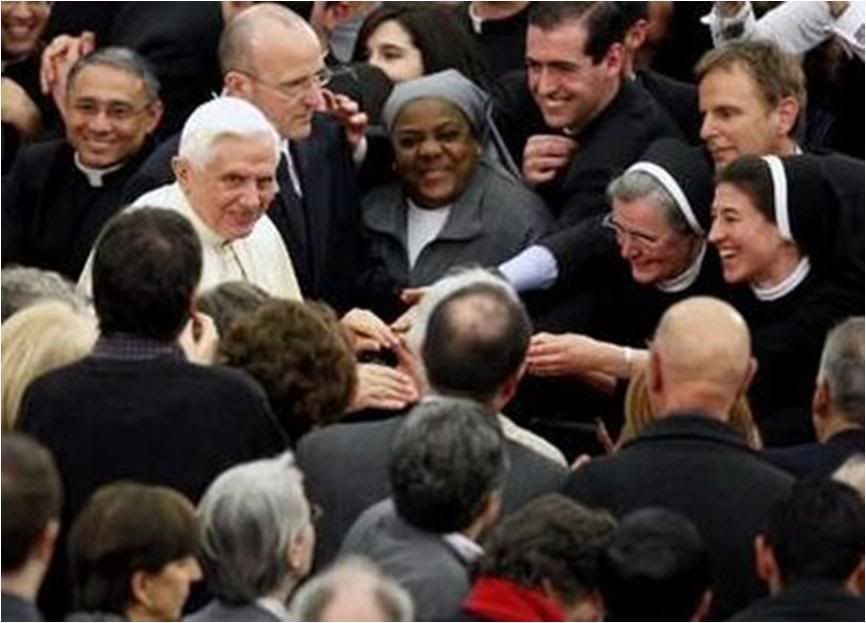 Left photo: Bending to pay homage to the Pope is Sir Matthew Festing, Grand Knight of the Order of Malta.
Left photo: Bending to pay homage to the Pope is Sir Matthew Festing, Grand Knight of the Order of Malta.
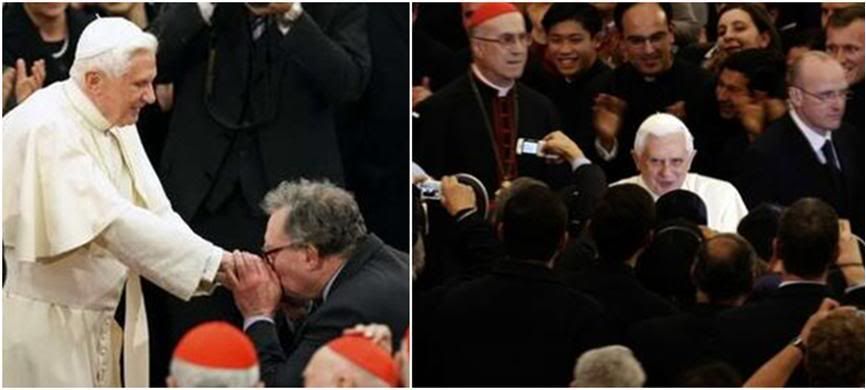
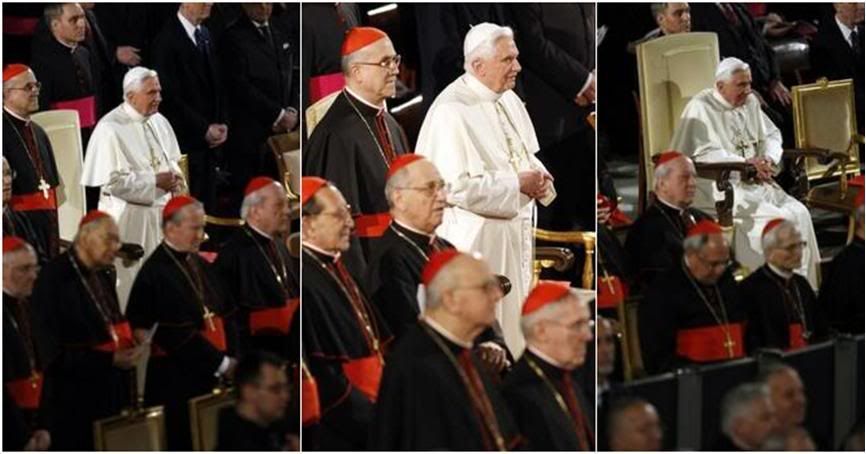 'May God guide the Church
'May God guide the Church
through historical events
that are not always tranquil'

ROME, Feb. 12 (Translated from Apcom) - At the end of a concert tonight to mark the 80th anniversary of Vatican City State, Pope Benedict XVI told the assembled guests, "Let us ask the Lord to guide firmly the destinies of Peter's boat through the not always tranquil events of history."
Handel's Messiah was performed by the Orchestra of Irish Radio-TV and the choir of Dublin Cathedral, Our Lady's Choral Society, under the direction of Proinnsias O Duinn.
"Above all," the Holy Father said, "let us ask the Lord to assist with the power of his Spirit him who is at the rudder of this boat, the Successor of Peter, so that he may be able to carry out faithfully and effectively his ministry to keep unity within the Catholic Church, which has its visible center in the Vatican, and extends to the extreme limits of the world."
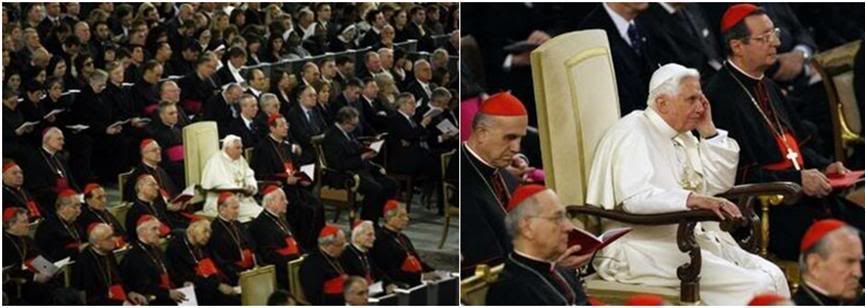 Here is a translation of the Holy Father's remarks after the concert:
Here is a translation of the Holy Father's remarks after the concert:
Cardinal Eminences,
Venerated brothers in the episcopate and priesthood,
Ladies and gentlemen:
At the end of this beautiful evening, I am happy to address a heartfelt greeting to all of you who have taken part in this concert to mark the 80th anniversary of the foundation of Vatican City State.
I greet the religious, civilian and military authorities present, and other illustrious guests, with a special thought for the Prelates of the Roman Curia and those who work in the various offices of the Vatican Governatorate who have gathered here to mark, with this initiative, a very significant occasion.
I wish to express my gratitude to His Eminence, Cardinal Giovanni Lajolo, president of the Pontifical Commission for Vatican City State, whom I also thank for the words of affection and devotion which he addressed to me before this concert.
I also greet the Secretary General, Mons. Renato Boccardo, and the other officials of the Governatorate. Naturally, I wish to express my appreciation to all those who cooperated in various ways to organize and carry out this musical event.
Certain that I speak for everyone present, I wish to express special words of gratitude and appreciation for the members of the RTE Concert Orchestra of Irish Radio and Television, to the members of Our Lady's Choral Society from Dublin, to Music Director
Proinnsias O Duinn, choirmaster Paul Ward, and the soloists.
I also address a special greeting to the many representatives of the faithful from Dublin who accompanied the cathedral choir of their city.
We have been offered excerpts from the famous oratorio Messiah by Georg Friedrich Händel, which is able to create a compelling spiritual atmosphere, thanks to an anthology of sacred texts from the Old and New Testaments which make up the fabric of the entire musical composition.
The orchestra and the chorus have succeeded to evoke admirably the figure of the Messiah, of Christ, in the light of the messianic prophecies of the Old Testament.
The richness of the musical counterpoint and the harmony of the singing have helped us contemplate the intense and arcane mystery of the Christian faith.
Once more it is evident how music and song, thanks to their easy interweaving with the faith, can confer a high pedagogical value in the religious field.
Music as art can be a particularly great way to announce Christ, because it succeeds to make mystery perceptible with an eloquence that is all its own.
This concert, which commemorates an anniversary significant for Vatican City State, is part of a program organized around the occasion with the theme "A small territory for a great mission".
Now is not the time for a discourse on the historic event in itself, about which various experts are offering their contributions to a Congress from their respective competences in multiple aspects.
Also, I will be meeting the participants of these days of study on Saturday, when I will address them. I must also thank everyone who has contributed to solemnize an occasion that is so significant for the Catholic Church.
In commemorating 80 years of Civitas Vaticana, we must give credit to those who have been the protagonists in these eight decades of history on this tiny piece of land.
In the first place, I wish to remember my venerated predecessor Pius XI. When he announced the signing of the Lateran Pacts and above all, the constitution of the State of Vatican City, he used an expression of St. Francis of Assisi. He said that the new sovereign reality was, for the Church, as for the Poverello, "that little of the body that was necessary to keep the soul together" (cfr Address, Feb. 11, 1939).
Let us ask the Lord, who firmly guides the destinies of 'the boat of Peter' through the not always tranquil events of history, to continue to watch over this tiny state.
Let us ask him above all to assist with the power of his Spirit him who is at the rudder of this Boat, the Successor of Peter, who that he may be able to carry out his ministry faithfully and effectively to keep the unity of the Catholic Church, which has its visible center in the Vatican and extends to the very extreme ends of the world.
I entrust this prayer to the intercession of Mary, immaculate Virgin and Mother of the Church. As I renew, in the name of everyone present, a heartfelt thank you to those who planned this evening, to the orchestra members, the singers, especially the soloists, I assure each one of remembrance in my prayers and I implore for everyone the blessing of God. Thank you.
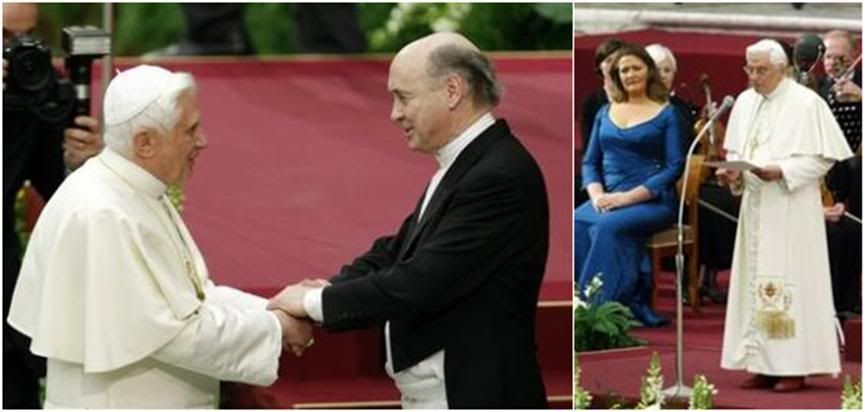
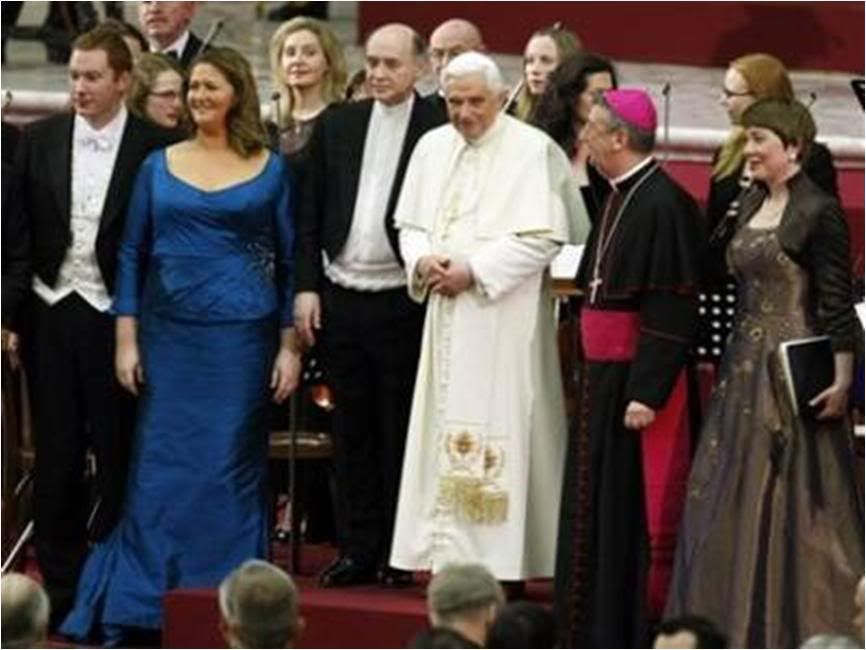
[Modificato da TERESA BENEDETTA 13/02/2009 02:50] |
 13/02/2009 13:59 13/02/2009 13:59 |
|
| | | OFFLINE | | Post: 16.581 | Registrato il: 28/08/2005
| Utente Gold | |
|

February 13
St Giles Mary of St. Joseph
OR today.
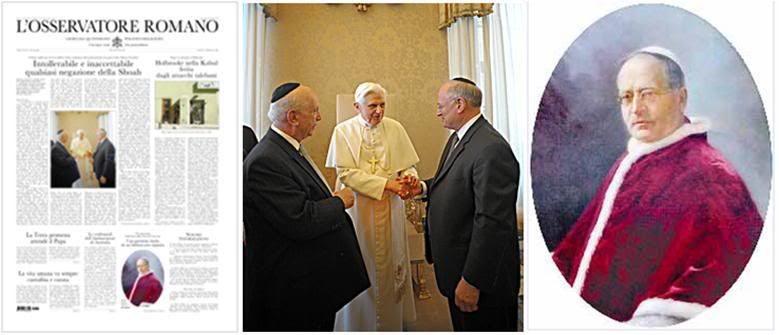
To the heads of American Jewish Oorganizations, the Holy Father
reaffirms irrevocable condemnation of anti-Semitism by the Catholic Church:
'Any negation of the Shoah is intolerable and unacceptable'
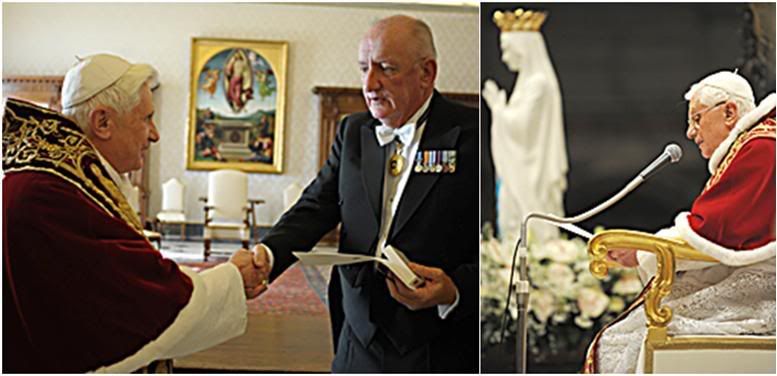 Other Page 1 stories: The Holy Land awaits the Pope; Benedict XVI welcomes the new Australian ambassador (above, left); on
Other Page 1 stories: The Holy Land awaits the Pope; Benedict XVI welcomes the new Australian ambassador (above, left); on
the World Day for the Sick on Wednesday (right photo), he says human life must always be protected and nurtured; the role of Pius XI
(top right photo) recalled on the 80th anniversary year of the Lateran pacts that established Vatican City State. Main international
news story is about President Obama's special envoy Richard Holbrooke arriving in Kabul in the wake of bombing attacks on
government buildings by the Taliban.
THE POPE'S DAY
The Holy Father met today with
- Cardinal William Joseph Levada, Prefect of the Congregation for the Doctrine of the Faith
- Cardinal Stanisław Ryłko, President of the Pontifical Council for the Laity.
- Cardinal Paul Poupard, emeritus Presidente of the Pontifical Council for Culture, and Papal Legate
to the VII centenary of the start of the Avignon Papacy to be marked in France on March 9-10.
- Bishops of Nigeria (Group 4) on ad limina visit.
The Vatican released a communique from the Pontifical Council Cor Unum to mark the 25th anniversary
of the John Paul II Foundation for the Sahel [sub-Saharan Africa] established in 1980 to assist
the 9 countries of the region in the protection of natural resources, fighting drought and desertification,
and alleviating rural poverty.
[Modificato da TERESA BENEDETTA 13/02/2009 15:31] |
 13/02/2009 14:25 13/02/2009 14:25 |
|
| | | OFFLINE | | Post: 16.582 | Registrato il: 28/08/2005
| Utente Gold | |
|
 On the preceding page, Benefan posted a Feb. 10 Lifesite News report
On the preceding page, Benefan posted a Feb. 10 Lifesite News report
freeforumzone.leonardo.it/discussione.aspx?idd=354494&p=250
about an American rabbi who denounced Pope Benedict's critics over the FSSPX excommunication recall, saying leftwing Catholics were simply using the Jews to attack the Pope. His analysis is right on!
The rabbi gave this follow-up interview to Lifesite News in Rome, in which he underscores the kind of constructive collaboration that should be going on between Catholics and Jews in defense fo common moral and social values.
One can only regret that a rabbi can see these things, but persons who are supposed to be intelligent Catholics cannot - because they allow their ideology and arrogant self-assertion to get in the way of the elementary principles of faith, including charity and truth.
Left wing of the Catholic Church
is destroying the faith,
says Orthodox rabbi
By Hilary White, Rome correspondent

February 11, 2009
ROME, February 11, 2009 (LifeSiteNews.com) - The dissident, leftist movement in the Catholic Church over the last forty years has severely undermined the teaching of the Catholic Church on the moral teachings on life and family, a prominent US Orthodox rabbi told LifeSiteNews.com.
Rabbi Yehuda Levin, the head of a group of 800 Orthodox rabbis in the US and Canada, also dismissed the accusations that the Holy See had not sufficiently distanced itself from the comments made by Bishop Richard Williamson of the Society of St. Pius X (SSPX) on the Holocaust.
"I support this move" to reconcile the traditionalist faction in the Church, he said, "because I understand the big picture, which is that the Catholic Church has a problem. There is a strong left wing of the Church that is doing immeasurable harm to the faith."
Rabbi Levin said that he understands "perfectly" why the reconciliation is vital to the fight against abortion and the homosexualist movement.
"I understand that it is very important to fill the pews of the Catholic Church not with cultural Catholics and left-wingers who are helping to destroy the Catholic Church and corrupt the values of the Catholic Church." This corruption, he said, "has a trickle-down effect to every single religious community in the world."
"What's the Pope doing? He's trying to bring the traditionalists back in because they have a lot of very important things to contribute the commonweal of Catholicism.
"Now, if in the process, he inadvertently includes someone who is prominent in the traditionalist movement who happens to say very strange things about the Holocaust, is that a reason to throw out the baby with the bathwater and start to condemn Pope Benedict? Absolutely not."
During a visit to Rome at the end of January, Rabbi Levin told LifeSiteNews.com that he believes the media furore over the lifting of the excommunications of the four bishops of the Society of Saint Pius X is a red herring.
He called "ridiculous" the accusations that in doing so Pope Benedict VXI or the Catholic Church are anti-Semitic and described as "very strong" the statements distancing the Holy See and the Pope from Williamson's comments.
Rabbi Levin was in Rome holding meetings with high level Vatican officials to propose what he called a "new stream of thinking" for the Church's inter-religious dialogue, one based on commonly held moral teachings, particularly on the right to life and the sanctity of natural marriage.
"The most important issue," he said, is the work the Church is doing "to save babies from abortion, and save children's minds, and young people's minds, helping them to know right and wrong on the life and family issues."
"That's where ecumenism and inter-religious dialogue has to go."
Although numbers are difficult to determine, it is estimated that the Society of St. Pius X has over a million followers worldwide. The traditionalist movement in the Catholic Church is noted for doctrinal orthodoxy and enthusiasm not only for old-fashioned devotional practices, but for the Church's moral teachings and opposition to post-modern secularist sexual mores.
Liberals in the Church, particularly in Europe, have bitterly opposed all overtures to the SSPX and other traditionalists, particularly the Pope's recent permission to revive the traditional Latin Mass.
The Vatican announced in early January that, as part of ongoing efforts to reconcile the breakaway group, the 1988 decree of excommunication against the Society had been rescinded.
Later that month, a Swedish television station aired an interview, recorded in November 2008, in which Bishop Richard Williamson, one of the four leaders of the Society, said that he did not believe that six million Jews were killed in the Nazi death camps during World War II.
[The reporter has her chronology mixed up. The Swedish interview was aired on the date, Jan. 21, 2009, on the revocation decree, which was not announced till January 24, at the end of the Week for Promoting Christian Unity - with the obvious idea to underline that Christian unity also includes unity within the Catholic Church itself.]
At that time, the media erupted with protests and accusations that the Catholic Church, and especially Pope Benedict XVI, are anti-Semitic.
Rabbi Levin particularly defended Pope Benedict, saying he is the genius behind the moves of the late Pope John Paul II to reconcile the Church with the Jewish community.
"Anyone who understands and follows Vatican history knows that in the last three decades, one of the moral and intellectual underpinnings of the papacy of Pope John Paul II, was Cardinal Ratzinger.
"And therefore, a lot of the things that Pope John Paul did vis-à-vis the Holocaust, he [Benedict] might have done himself, whether it was visiting Auschwitz or visiting and speaking in the synagogues or asking forgiveness. A lot of this had direct input from Cardinal Ratzinger. Whoever doesn't understand this doesn't realise that this man, Pope Benedict XVI, has a decades-long track record of anti-Nazism and sympathy for the Jews."
[Modificato da TERESA BENEDETTA 16/02/2009 03:13] |
 13/02/2009 15:03 13/02/2009 15:03 |
|
| | | OFFLINE | | Post: 16.583 | Registrato il: 28/08/2005
| Utente Gold | |
|
 MORE INITIATIVES
MORE INITIATIVES
IN SUPPORT OF THE POPE
Thanks to Fr. Finigan on his blog HERMENEUTIC OF CONTINUITY
the-hermeneutic-of-continuity.blogspot.com/
for calling attention to the FRENCH site of the FSSP - the St. Peter Fraternity (whose French acronym happens to be the first part of the FSSPX acronym - just without the X, because their P stands for St. Peter, not for St. Pius X) - which invites the faithful to join a novena starting Feb. 14 in support of the Holy Father. Very appropriately, It begins on St. Valentine's Day and ends on The Feast of Peer's Chair.
You may also add your name to the FSSP support list which will be sent on to the Holy Father.
www.fssp.fr/neuvaine.html
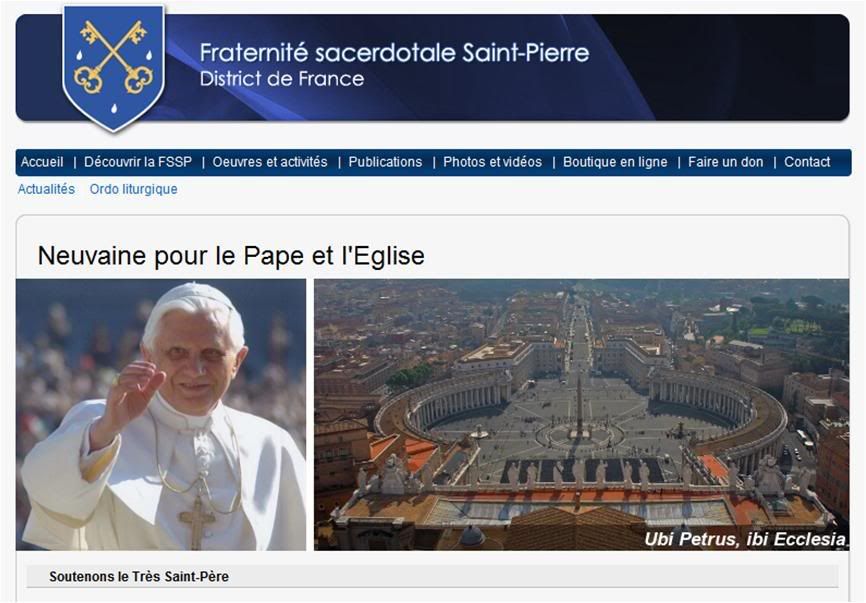
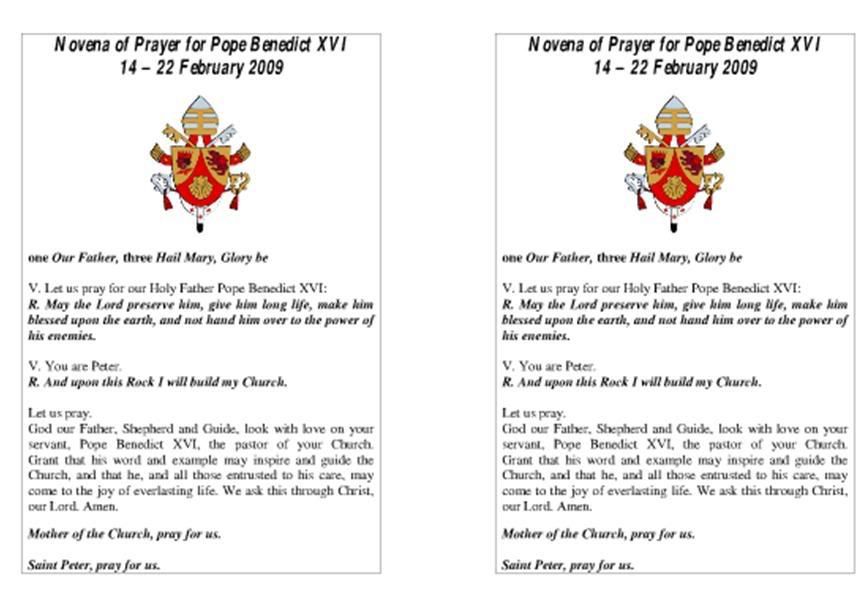 I can't blow up the English version of the 'prayer card' further because it is not provided as an image file and I had to crop it from what was posted.
I can't blow up the English version of the 'prayer card' further because it is not provided as an image file and I had to crop it from what was posted.
You may also want to visit this excellent Italian site for Catholic resources
www.maranatha.it/
which highlights the familiar Latin prayer for the Pope in its short version.
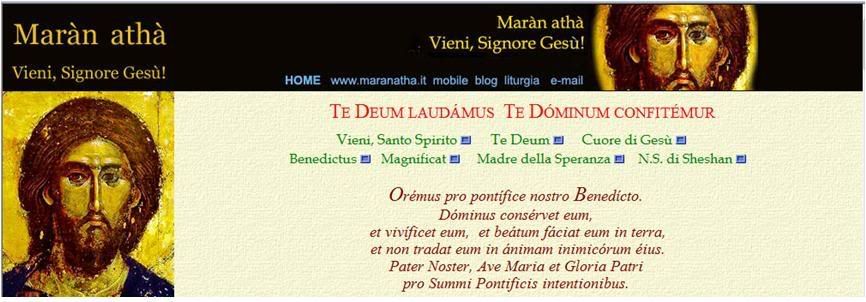
[Modificato da TERESA BENEDETTA 13/02/2009 15:45] |
 13/02/2009 17:18 13/02/2009 17:18 |
|
| | | OFFLINE | | Post: 16.584 | Registrato il: 28/08/2005
| Utente Gold | |
|
 Fathers Bux and Vitiello have a regular theological column distributed by FIDES news agency which generally requires subscription access, so I translated this from the French version published on the EM site.
The prestige of Judaizers
Fathers Bux and Vitiello have a regular theological column distributed by FIDES news agency which generally requires subscription access, so I translated this from the French version published on the EM site.
The prestige of Judaizers
vs. the 'folly' of the Apostles
by Frs. Nicolas Bux and Salvatore Vitiello
Translated from

Feb. 13, 2009
In his commentary on the Letter to the Galatians (Chapter X - the Law and Grace), St. Augustine recalls the amazement of Paul at the members of this community, who were troubled or fascinated by the prestige of the 'Judaizers'.
These were the Christians of Jewish origin who placed great importance on Judaism to the point of saying it was an indispensable condition for becoming a Christian. And so, instead of adhering to Jesus and his Gospel, they harked back to Moses and his Law.
St. Paul writes: "To them we did not submit even for a moment, so that the truth of the gospel might remain intact for you" (Gal 2,5).
This phenomenon seems to have revived in our day. One sees it, for instance, in the preference for expressions such as the "First" and "Second Testaments [in place of 'Old' and 'New'], as though they were equivalent - forgetting that the New was the fulfillment of the Old, and in the liturgy is called the 'New and Eternal Covenant'.
Did St. John not write, "because while the law was given through Moses, grace and truth came through Jesus Christ" (Jn 1,17)?
Moses, who was great prophet, is still just a man. Hesus is the Son of God, who in resurrecting, obtaiend for us the remission of sins, and re-established man's friendship with God. Thus, teh Old Tesmanent receives light and full hope only through the Resurrection of Jesus of Nzareth, Lord and Christ.
As the scholar Jacob Neusner - observant Jew and rabbi - has shown, Jesus in asking adherence to him and not to the Torah, underscored a distinction from the Jweish religion.
Paul, a zealous learned Jew, was aware that adherence to Jesus Christ was not a reprise of the Jewish faith, or he would not have declared his life before his covnersion as irrevocably over.
He had himself baptized, he received illumination - as the early Church referred to Baptism - because this is the sacrament that allows the Christian to see the truth with the new eyes of faith. But it must also be made clear - this can only happen through an encounter with Divine Grace.
The Apostles, who wer Jews, undestood the Resurrection of Christ from the dead as the true divine judgement from God the Father who, in this way, categorically revoked the verdict of the Sanhedrin, which up to then, all Jwews had considered valid.
Thus, each human judgment is subject to the judgment of the Cross, which reveals the wisdom and the power of God. TYhe Cross is the 'folly' that the Apostles proclaimed on which the Church was founded.
If they had been more concerned about not scandalizing the Jews or simply falling in with pagan ways, then the Church would not have been like a kingdom or a family divided in itself, falling into ruins, as Jesus warned (cf Mt 12.25).
The obsession to be accepted by the world is a frequent temptation for men of the Church. So that this does not happen, and that the world may not be scandalized by it, it is necessary first of all to use the same language: the faithful should speak as their parish priest does; relgiious orders as their Superior;
in the voice of their parish priest; priests in the voice of their Bishop, and cardinals in the voice of the Pope who made them such.
What must always be heard is the one Catholic Church, not one of its particular communities. A Church founded on the opinion of every ecclesiastic would nover have survived, if only because it's a short step from from 'opinion' to heresy.
Only in full communion with Peter is there full communion with the Church because he is "the perpetual and visible principle and foundation of the unity of the Church" in relationship with the invisible principle which is the Holy Spirit (Lumen gentium 23).
This is one of the reasons why one must defend Vatican-II, because this truth is indispensable, whether one is within the Church or outside it, for the dialog with non-Catholcis and non-Christians.
In any case, no one should be deluded:
Dialog does not fend off violent opposition. Christianity has hada to face such opposition from the very beginning, from Jewish communities or local authorities acting on denunciations made by Jews.
Dialog does not prevent persecution. We see it in our day in different parts of the world. It may be bloody or verbal, open or clandestine, by intimidation or pressure.
Persecutors are never satisfied because "the light shines in the darkness, and the darkness has not received it...He came to his own, but his own did not accept him" (Jn 1, 5.11).
If one is aware of this, one can help the Holy Father in the exercise of his personal responsibility as Universal Pastor towards the Universal Church.
*********************************************************************
Frs. Bux and Vitiello present a new way of looking at the never-ending 'reproach' to the Pope and the Church by militant hypersensitive Jews acting in the name of 'dialog' = an attitude I referred to earlier as reverse bigotry against Catholics.
Anti-Catholicism is just as despicable as anti-Semitism, and some Jewish leaders unconsciouly or subconsciously exercise it all the time, but no one reproaches them for it because in recorded history, the only actual avowed persecution of Christians by Jews was in the early Church. (After that, Christianity simply spread throughout the known world and left Judaism the preserve of the chosen few.)
In any other context, the practically relentless attacks against the Pope and the Church by some Jews who use the slightest pretext to relaunch it after brief periods of retrenchment would be called by its right name - persecution.
But no one thinks of it that way because the Jews are, after all, a restricted religion, a tny minority compared to the billions of Christians and Muslims and the hundreds of millions of Buddhists and Hindus.
Let me be clear: I have no animus against Jews in the generic sense - there was a time I even deluded myself into considering becoming a Jew, imagine that! - and my personal circumstances bind me irrevocably to someone who was raised an observant Jew and trained to be a rabbi.
But I do resent many of their most vocal representatives today whose anti-Catholic bigotry can no longer be concealed by their now-familiar and condescending expressions of 'satisfaction - for now' that the Pope has 'redressed' perceived offenses to them by himself and the Church.
Yet in the name of 'dialog' - but above all, of Christian charity - we must learn to be forbearing and forgiving and live with their 'viciousness'.
[Modificato da TERESA BENEDETTA 13/02/2009 19:18] |
 13/02/2009 18:14 13/02/2009 18:14 |
|
| | | OFFLINE | Post: 3.578 | Registrato il: 23/11/2005
| Utente Master | |
|
I wasn't sure whether to post this in the News about the Church thread or here but since it involves reaction to decisions by the pope, I'm putting it here.
Austrian Catholic Church holds meeting amid bishops uproar
By Boris Groendahl
Fri Feb 13, 2009 11:43am EST
VIENNA (Reuters) - Austria's Catholic Church will hold a crisis session on Monday to discuss an uproar over a new provincial bishop and the Vatican's readmission of a banned bishop who denies the Holocaust, officials said on Friday.
Faced with rising numbers of Catholics quitting the Church and protests from clergy, Vienna Cardinal Christoph Schoenborn called all diocesan bishops to the one-day meeting to "give our best to overcome the crisis."
Austrian Catholicism is in turmoil because Pope Benedict, one week after readmitting arch-traditionalist Bishop Richard Williamson, named an auxiliary bishop in Linz who said Hurricane Katrina in 2005 was God punishing New Orleans for its sins.
The two appointments, both apparently without consultation with local churches, sparked doubt about Benedict's leadership and concern the Church was turning increasingly conservative.
Schoenborn said the uproar had caused "irritation and resignation" and the Church needed "damage control" for the sake of its future, according to the Catholic news agency Kathpress.
Four times as many Catholics have officially quit the Church in Linz so far this year as in early 2008, the Austrian Press Agency APA reported, and departures have also been running higher than usual in Vienna, Salzburg, Tyrol and Lower Austria.
On Tuesday, 31 of the 39 deans (senior priests) of the Linz diocese passed a declaration of no confidence in Wagner, who has condemned the Harry Potter books as satanic, said homosexuality was curable and ruled out lay participation in Church affairs.
TIMING Fueled UPROAR
Schoenborn's spokesman Erich Leitenberger said the timing of Wagner's appointment fueled an uproar unleashed by the lifting of excommunications against Williamson and three other bishops of the ultra-traditionalist Society of Saint Pius X (SSPX).
"The proximity of those two events has for some people created the impression there was a masterplan, that the Church wanted to roll back the Second Vatican Council," he said, referring to major Church reforms from the 1960s.
"This is of course nonsense," he told Reuters.
Leitenberger said Wagner had been given the order not to give any further interviews to stop fanning the flames.
The liberal lay Catholic movement We Are Church urged Austrians not to quit the Church but also not to contribute money to it. It announced it would set up "solidarity accounts" for contributions to be held "until the situation improves."
Like bishops in Germany and Switzerland, Austrian bishops reacted allergically to the readmission of Holocaust denier Williamson and several-- including Schoenborn, a close ally of the Pope -- said he should have no official place in the Church.
In one of the bluntest criticisms from a prelate, Salzburg Archbishop Alois Kothgasser said on Tuesday the SSPX bishops seemed to be heretics who had shut themselves out of the Church.
He also said the Church must not shrink into "a sect ... with few but strictly obedient members" -- a veiled criticism of Pope Benedict, who once suggested the Church might have to reduce to a hard core to survive the secular modernist age.
(Additional reporting by Tom Heneghan in Paris)
**********************************************************************
So what did Cardinal Schoenborn tell the Pope about the situation in Austria when they met last Sunday? They met one week after the announcement of Mons. Wagner's nomination and the expected Pavlov-dog reflexive outcry came from the liberal elements of the Church in Austria (it appears the majority).
Why has he called the Austrian bishops to a meeting only after the 'deans' of Upper Austria issued that insolent note yesterday reproaching the Pope for naming Wagner?
Schoenborn cannot say that 'local bishops' were not consulted because the normal process is for the local bishops to submit their recommendations.
Assuming the opponents of Wagner are right and that his name was never submitted by the Austrian bishops' conference to the Pope, shouldn't Schoenborn have anticipated the outcry before the announcement was made and prepared accordingly? This is the very failing he criticized the Roman Curia for, in the Williamson case.
Or is he going to claim very soon that even he was not informed the Pope would nominate Wagner?
I originally had no intention of translating that first piece I read in kath.net about the reaction of his own parish to Mons. Wagner's promotion - because at the time it was purely of local interest (and I was obviously hoping Wagner wouldn't become the next Williamson) - but I will now look it up if only to show that no issue is ever only black and white.
After all, to look down on Harry Potter and to think natural catastrophes are a punishment from God are simply opinions - even if not widely shared - not a denial of objective fact!
As opinions, they are not any less improper to hold - and certainly, far less injurious to the faith - than that Pope Benedict XVI is annulling all of Vatican II by his actions.
And the claim that more 'Catholics' have left the Church in the past week because Wagner was named by the Pope is bogus and disingenuous argumentation. Most likely, those that did already left the Church in spirit and in practice long ago - and have simply 'formalized' it now.
They are not a net loss, in that sense, and obviously Cardinal Schoenborn's playing along with their liberal tendencies has not helped keep them in!
I hope I can find and translate the item about Mons. Wagner expeditiously.
TERESA
P.S. Ok, I;ve found that original article, plus a Feb.6 article entitled 'Cardinal Schoennborn stands behind the nomination of Bishop Wagner' and a Feb. 11 article about Mons. Josef Clemens defending Mons. Wagner. But let me first post the translation of the item about Schoenborn's support:
Cardinal Schoenborn stands
behind Mons. Wagner
Translated from

VIENNA, Feb. 6 (kath.net) - In his column on Friday in the free newspaper Heute, Cardinal Christoph Schoenborn defended the nonination of Gerhard Wagner as Auxiliary Bishop of Linz.
"He seems to do very well where he has been assigned," Schoenborn said.
Schoenborn said he was amazed at the media outcry against the nomination of the conservative prelate, because "according to all reports, he has led his parish in an outstanding manner. He has the best relations with young people. His parish faithful love him. His churches are full. What else do they want of him?"
Perhaps he can be 'somewhat sharp' and is 'fond of pithy sayings', but he seems to do very well in his parish, Schoenborn added. Schoenborn also said that 'convervative' means 'somewho saves and preserves', but "a bit more conservation would do us all good".
The Vatican announced Wagner's nomination on January 31. One week later, on Feb. 6, Schoenborn appeared to believe that the outcry against Wagner was only in the media. And now he is talking of widespread 'indignation' and 'damage control'!
Is he that naive or did he refuse to see how many of the clergy in Austria are really more 'We are Church' than 'cum Ecclesia'????
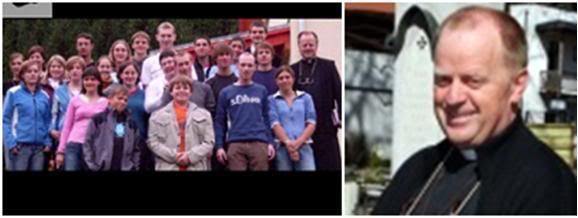
Mons. Wagner and some of his parishioners.
I have now posted the January 31 KATHNET article about Mons. Wagner in NOTABLES. It would appear - after reading HISs background and record as a parish priest as seemingly the very model of a model parish priest - that the only 'blots' in his book are his disapproval of Harry Potter and saying Katrina was a punishment for 'the sins of New Orleans'.
Also posted - a second article datelined Feb. 11 from Rome, where two Vatican Curial officials, including Mons. Clemens, Cardinal Ratzinger's former longtime private secretary, vouch for Mons. Wagner.
[Modificato da TERESA BENEDETTA 15/02/2009 02:31] |
 14/02/2009 01:45 14/02/2009 01:45 |
|
| | | OFFLINE | | Post: 16.589 | Registrato il: 28/08/2005
| Utente Gold | |
|
 PATRIARCH KIRILL'S MESSAGE
PATRIARCH KIRILL'S MESSAGE
TO POPE BENEDICT XVI
Translated from
the 2/14/09 issue of

The Patriarch of Moscow and all Russia, Kirill, sent Benedict XVI a letter in response to the Pope's greetings on his election last month to succeed the late Patriarch Alexei II. Here is a translation of the letter which was written in Russian:
Holiness,
I thank you from the heart for the warm words of best wishes on my election as Patriarch of Moscow and all Russia, and also for having sent to my enthronement ceremonies a high-ranking delegation led by Cardinal Walter Kasper, president of the Pontifical Council for Promoting Christian Unity.
Obedient to the will of God, with humility and awareness of the responsibility I have assumed, I accepted the decision expressed by the entire Russian Orthodox Church assembled in a Local Council, to entrust to me the cross of the patriarchal ministry.
Among the many tasks presented to the Primate of the Russian Orthodox Church, one of the priorities is the fundamental need to attest and affirm the values of the Gospel of Christ in contemporary society. I am convinced that the dialog and collaboration of all who call themselves Christian must contribute to this end.
Following the traditions that were created during the years of ministry of my predecessor, the Most Holy Patriarch Alexei II, I assure you that the Russian Orthodox Church will remain unchangeably open to cooperation with those who declare themselves to be followers of the Lord Jesus Christ, and who maintain the traditional vision about the contents of the message that Christians must bring to the contemporary world.
Among the collaborators in this field, the Catholic Church of Rome occupies a special place, just as you personally, Holiness, occupy a special place in the common efforts of Christians oriented to the achievement of the aforementioned objective.
I sincerely hope for a fruitful development of relations between our Churches.
In turn, I wish you peace, health, and the assistance of God in your work.
With affection in the Lord.
However, the hardline from Moscow remains the same as it was with Alexei II, as this report today makes clear once again:
Moscow Patriarchate official says
Obstacles to meeting between Patriarch Kirill
and Pope Benedict XVI are still there

Moscow/Paris, February 13 (Interfax) - The Moscow Patriarchate believes the obstacles hindering a meeting between Patriarch Kirill and Pope Benedict XVI have not been removed yet.
"The possibility of such a meeting [between the Pope and the Patriarch] was never ruled out under Patriarch Alexei II, but there are still obstacles to it, specifically, cases of proselytism. We believe that there is a need to work out a common position and, after that has been done, organize such a meeting," Bishop of Vienna and Austria Hilarion, who represents the Russian Orthodox Church in European international organizations, said on a televised linkup between Moscow and Paris on Friday.
Bishop Hilarion said that Patriarch Kirill will continue the policy of his predecessor on Orthodox-Catholic relations and "will do everything to remove all obstacles hindering this meeting."
Although Patriarch Kirill wants such a meeting to take place as soon as possible, he believes "there is no need for it to take place in front of television cameras," the Bishop said.
"We cannot specify its dates because we are not talking about dates, but about the purposes of this meeting. If it is well-prepared, it will mean a real breakthrough in our bilateral relations," said Bishop Hilarion.
He also recalled that one of the problems hindering productive dialogue between the Orthodox and Catholic Churches is "the difficult situation" with the opening of new Greek-Catholic parishes and
dioceses in Western and Eastern Ukraine.
**********************************************************************
Oh, so the 'proselytism' they have been drumming up the past four years is in the Ukraine! It couldn't possibly have been in Russia itself where the Roman Catholic Church only has four canonical jurisdictions which it isn't even allowed to call 'dioceses'!
But the religious picture in the Ukraine - a very religious country, it appears - is also possibly the most confusing, as any look at a summary of 'Religion in Ukraine' will show. In fact, it is even questionable why Moscow should want to be the only Orthodox authority in the Ukraine, which as Kievan Rus, was the first Slavic state ever to be born, antedating the Moscow state by centuries.
Ukraine was a distinct ethnographic territory all that time until it was absorbed by the Russian Empire in the 18th century. It had a brief period of independece after the First World War, but was then sucked gack into the Soviet Empire. It became independent again with the collapse of the USSR.
Orthodoxy is carved up among two rival Patriarchates of the Russian Orthodox Church - that of Moscow and that of Kiev; the Ukrainian Autocephalous Orthodox Church, which looks to the Ecumenical Patriarchate based in Constantinople rather than to Moscow; and a couple of other 'old, established Orthodox communities".
And Catholicism itself is represented by the Greek Catholic Church (4 million members), led by Cardinal Lyubomir Husar, and the regular Roman Catholic Church (1 million), now headed by Archbishop Mieczysław Mokrzycki ['our Mietek'] in the diocese of Lviv, which adjoins Poland. [A good opportunity to show his official picture here!]
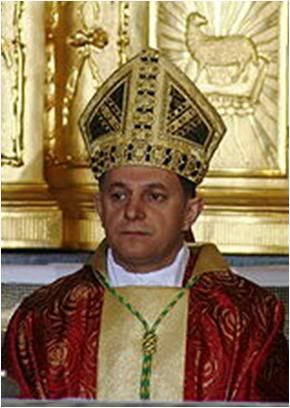
Moscow complaining about proselytism by the Greek Catholic Church (also known as the Uniate Orthodox Church) seems unreasonable, considering that the Moscow Patriarchate has only half the membership in the Ukraine (12 million, or 26% of the population) as the Kiev Patriarchate (24 million, or about half the population), which apparently has no problem with Catholics exercising their right to preach to anyone who is receptive).
[Modificato da TERESA BENEDETTA 14/02/2009 04:04] |
 14/02/2009 13:18 14/02/2009 13:18 |
|
| | | OFFLINE | | Post: 16.590 | Registrato il: 28/08/2005
| Utente Gold | |
|
 I have, of course, studiously avoided posting - or even reading, except for a cursory speed-read - the vicious stories that have been out there in the MSM since January 24, aimed directly at Benedict XVI and the Church by virtually all and sundry. It seemed everyone couldn't wait for the chance to take his meanest swing at the Pope - iconoclasts gone hysterically, blood-curdlingly, bestially wild.
I have, of course, studiously avoided posting - or even reading, except for a cursory speed-read - the vicious stories that have been out there in the MSM since January 24, aimed directly at Benedict XVI and the Church by virtually all and sundry. It seemed everyone couldn't wait for the chance to take his meanest swing at the Pope - iconoclasts gone hysterically, blood-curdlingly, bestially wild.
Here's an article that mentions some of those calumnious 'slings and arrows', many of which are really over-the-top unimaginable, too ludicrous, were they not so obviously nasty and totally wrong - take an anti-apoplexy pill before reading! But after it has gone through the ludicrous, the article also offers a reflection on the mission of Peter in the light of how Jesus conferred this mission on him singularly.
The insidious opposition to Benedict XVI
conducted through pitiless lies
by Alberto Giannino
Translated from

Feb. 12, 2009
Benedict XVI has been brought to the bar by secularists, anti-clericalists, leftist Catholics and Protestants - piling on after the Jews - as he rounds up four years of a far-seeing Pontificate.
The Financial Times of London, and Italy's L'Espresso and La Stampa, have been downright gross and disrespectful - speaking of him as if he were born yesterday, as if he were not the Successor of Peter [let alone Vicar of Christ on earth!].
Lucia Annunziata who works for both RAI (Italian state TV) and La Stampa, interviewed Hans Kueng, who spoke of "empty churches, restoration, a Pope who no longer lives in this world, who has isolated himself from other human beings, screened off by his grand processions and pompous ceremonies from the problems of the faithful, such as sexual morality, the pastoral care of souls, contraception."
The Church, Kueng said, "is in crisis. I hope the Pope realizes that. [DUH! Let me count the books he has written about it since 1967!]
I would be happy if he took steps to reconcile with the faithful who are progressive. But Benedict XVI does not see that he is alienating himself from the great majority of the Catholic world and of Christianity. He does not see the real world, only the world of the Vatican" [Oh, why am I bothering to comment on this bitterly envious blathering dodo? Someone please taser him the next time he opens his trap!]]
La Stampa has its senior Vaticanista Marco Tosatti to attack the Pope ad hominem - claiming that Benedict XVI has been living in solitude surrounded by very few co-workers and dedicated only to finishing his book on Jesus and his social encyclical. [So who's the guy we see in the daily videos and photographs granting all those audiences and addressing all those people? A double? After decades of long working days and a routinely multi-tasking work ethic, suddenly he has turned into a selfish monomaniacal recluse?] As much as to say he has only been thinking of his personal affairs while ignoring the Church! [I'd like to know what Tosatti has been reporting the past four years, then - all of a sudden, the subject of his beat turns him into a do-nothing, not-there, out-of-it Pope, and he was never aware of this before? The caricature is not even plausible!]
Barbara Spinelli, also in La Stampa, speaks of a collapse of Benedict's authority, of a loss of his leadership, and of incapacity to govern.
L'Espresso and Il Mattino of Padua published a letter from an alleged priest who mocks the Pope as 'mio nonno' [my grandfather], and not having any real point to criticize him on, attacks him for his elegance, for the Fisherman's Ring, for the liturgies he celebrates (as though they were for his glory and not a reflection of the splendor of God for the glory of God and the spiritual upliftment of the faithful).
This young priest does not know that in his career and in his life, Joseph Ratzinger never once sought higher office: it always sought him out, and he always obeyed. He does not know he thrice asked John Paul II to let him retire, and each time, agreed to stay on, in the name of service to the Pope and the Church. He does not know that Cardinal Ratzinger was accessible and generous with his time to anyone who approached him, that even as the second most important man in the Vatican, he fed stray cats and led the simplest life.
The priest from Padua claims to be scandalized by the vestments that the Pope wears for liturgical rites - as if he were the first Pope ever to wear such garments. What would he have the head of the Catholic Church do - walk around unkempt and scruffy, in slovenly robes and worn-out shoes?
And he asks how he can continue carrying on his priestly ministry for his faithful if Benedict XVI does not change! To regain 'his' trust, the priest believes Benedict XVI, all of 81 and almost 82, should sleep out in the open or under a bridge. What seminary did this priest attend? Did he learm anything at all? How did he ever come to be ordained?
If some men of the cloth themselves indulge in this sort of nonsense against the Pope, then what outrages can we not expect from the secular sectors of public opinion?
Here's the Financial Times of London, Protestant and liberal, which wrote that "Benedict XVI has bumbled into the worst crisis of his four years in the Papacy.... Cardinals and bishops are mobilizing to revolt against him, even if, for now, the object of their disquiet is the handful of figures who surround the Pope [Who? The Memores Domini? The two private secretaries? Or imaginary bugbears?] who, they fear, is becoming an 82-year-old recluse, buried in his reading and writing, vulnerable to manipulation". [Do they really think age has suddenly robbed him of all his senses and faculties? It is obvious these guys have never bothered to watch any videoclips of his events or look at the news agency photos, no matter how perfunctory, that capture a dynamism that would put men half his age in the shade!]
This, says the Financial Times, "is the indulgent explanation of why the Pope revoked the excommunication of four ultra-traditionalist bishops". {And what would be the non-indulgent explanation? That he set out to self-destruct?]
It goes on: "The Williamson affair has reduced the Pope to an ill-treated Rottweiler of God....The truth, our sources say, is that the Pope is timid to the point of reclusion, and therefore one who can potentially be intimidated easily". [Hmm, these clueless types need to read something like Fr. Di Souza's recent peace on the fearless fighting Ratzinger!]
Truth to say, the Times continued, "the image of a rottweiler was wrong... (for) a timid isolated Pope", an image far from the 'Rottweiler of God' that the international media themselves had coined for him when he was a cardinal.
Such criticisms are laying the groundwork to support the idea that Benedict XVI is incapable of will or understanding. That he is not in full possession of his faculties. Which is what all the articles and opinions in the past two weeks have tried to evok - and it does not take close reading to see the intention.
That is, if Benedict XVI is manipulable, fearful, even terrified, how could he possibly carry out his mandate? If, before he has turned 82, they are already floating these suggestions, imagine what they will be saying when he reaches 85.
Benedict does not evangelize. Hhe is not proclaiming the Gospel to everyone as he should. He is all alone in his ivory tower. He's a misanthrope. He never speaks to anyone, much less seek any counsel. Lie after lie reported as fact, that only mean journalists currying favor with their editors would think of.
Why don't they watch the videos of his trips around Italy and to foreign countries? Have they forgotten his two unparalleled encyclicals, don't they read his numerous messages, his seminal catecheses on Wednesdays, his homilies during the past four years?
Why don't they watch him when he visits the parishes of Rome, when he meets with priests, seminarians, young people, all the faithful?
No, mesdames and sirs! You know quite well that Benedict XVI is a true worker in the vineyard of the Lord, a Church that continues to be the 'mother and teacher' as John XXIII defined her.
He is placing rational order back in the seminaries. He is asking that would-be priests be psychologically fit. He has asked zero tolerance for priests who commit sex offenses.
This is a Pope who reviews the available files of every man who is proposed to be a bishop - a chain in the apostolic succession - unlike John Paul II who depended completely on the work of Cardinal Re.
Benedict XVI is attentive to Scriptures as well as Tradition, and the continuing Magisterium of the Church. But secularists and Protestants bristle when they hear the word 'Tradition' - they break out into hives.
But that is why he lifted the excommunications. Among other things, he is reminding all instant theologians that there are things in the Conciliar texts of Vatican II which they do not know or have chosen to ignore, although they cite Vatican-II with ever breath
He is proceeding with inter-religious dialog with the Muslims and tge Jews, and ecumenical dialog with the Orthodox and the Protestants.
But some Muslims and Jews do not like his teaching. Like many Protestants, they will not forgive Joseph Ratzinger for the 2000 Declaration Dominus Iesus about the uniqueness and universality of salvation in Jesus Christ.
And then there is is his insistence on certain basic non-negotiable principles about life, marriage, the family and the right of parents to provide a Catholic education for their children if they so choose. This has earned him the rage of rabid secularists who accuse him of interference in public affairs simply because he expresses the positions of the Church.
One woman politician (one of those self-styled 'adult Cathiolics) said last year that the Pope should limit himself to speaking only of 'the things above', not life on earth.
They forget he is the Successor of Peter and the Vicar of Christ on earth, and that it is his duty to preach Christ's message - to proclaim God's Word to each and everyone to the very ends of the earth.
He does not care about their corrosive words, or about being popular. But he does what he believes to be right. He governs the Church observing collegiality with his cardinals, listening to the bishops' conferences and the bishops' synods. And obviously, he does not make his decisions in isolation.
He is a gentle person but firm about what he believes. Among this is Jesus's words to Peter, of whom he is in the direct line of succession, as the rock on which he was building the Church, and his words to him after the Resurrection: "Feed my lambs".
There is an objective relationship between the mission attested in John's Gospel and the promise cited by Matthew in his (cfr Mt 16,18-19). In Matthew's text was the announcement. In John's text, the complement of that proclamation.
The words "Feed my lambs' manifest the intention of Jesus to assure the future of the Church he had founded, under the leadership of a Universal Pastor, Peter whom he named the rock, who would receive 'the keys of the kingdom' with the power to 'bind and loosen'.
Jesus, after the resurrection, gives concrete form to that proclamation and promise at Caesarea Philippi, by instituting the authority of Peter in the pastoral ministry of the Universal Church. Peter's mission includes the task of "confirming the brothers" in the faith as a primary function.
'Confirm the brothers' and 'feed the lambs' thus make up the mission of Peter - one might say the proprium of his universal ministry.
As the Second Vatican Council affirms, the constant tradition of the Church has rightly maintained that the apostolic primacy of Peter includes the supreme power of Magisterium (cf. Denz.-S.3065).
Both primacy and the power of the Magisterium were directly conferred by Jesus on Peter singularly, though both prerogatives are given to the Church as a whole, without however deriving from the Church, but only from Christ.
Primacy was given to Peter (cf. Mt 16, 18) as - to use Augustine's term - “totius Ecclesiae figuram gerenti” (Epist., 53,1.2), in that he personally represents the entire Church. And the task and power of the Magisterium is conferred on him as confirmed faith so that he may be confirming for all the 'brothers' (cf. Lk 22, 31 s).
But everything is in the Church and for the Church, of which Peter is the foundation, holder of the keys and pastor of its visible structure, in the name and through the mandate of Christ.
Jesus conferred on Peter his pastoral mission: "Feed mu lambs" - like an extension of the mission of Jesus who said of himself: "I am the Good Shepherd" (Jn 10,11). Jesus, who gave Simon his quality as 'rock' also communicates to him his mission as 'shepherd'.
It is a communication that implies an intimate communion which appears even in Jesus's formulation: "Feed my lambs", as he had said, "On his rock I will build my Church" (Mt 16,18).
The Church is the property of Christ, not of Peter. Sheep and lambs belong to Christ, and tn no one else. They belong to him as the 'good Shepherd' who "offers his life for his sheep' (Jn 10,11).
Peter assumes the pastoral ministry for all men redeemed "with the precious blood of Christ" (1 Pt1,19). The character of the service which marks the power linked to the mission conferred on Peter is based on the relationship between Christ and men, who have become his through redemption: a service to him who alone is 'pastor and guardian of our souls" (1 Pt 2,25), and at the same time, to all whom Christ the Good Shepherd has redeemed at the price of his sacrifice on the Cross.
Thus, the content of the service that Benedict XVI renders today is clear: as the shepherd leads his sheep to places where they can find food and security, so the pastor of souls must offer them the food of God's Word and of his holy will (cf Jn 4,34), assuring the unity of the flock and defending it from any hostile incursion.
[Modificato da TERESA BENEDETTA 14/02/2009 18:23] |
 14/02/2009 13:47 14/02/2009 13:47 |
|
| | | OFFLINE | | Post: 16.592 | Registrato il: 28/08/2005
| Utente Gold | |
|

February 14*
 St. Cyril, Monk, and
St. Cyril, Monk, and
St. Methodius, Bishop
Co-Patrons of Europe
OR today.
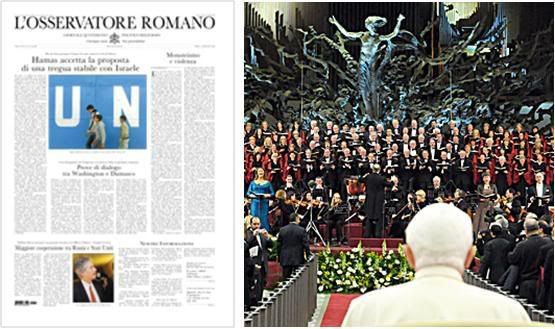
The main story on Page 1 is that Hamas accepts proposal for a 'stable truce' with Israel, even as
it continues to launch rockets from Gaza against southern Israeli cities. There are two stories
about the new US administration's efforts to improve relations with Syria and Russia; and a teaser
about the Holy Father's remarks at the concert Wednesday evening to mark the 80th anniversary
of Vatican City State (photo above).
THE POPE'S DAY
The Holy Father met today with
- Cardinal Giovanni Battista Re, Prefect of the Congregation for Bishps (weekly meeting)
- Bishops of Nigeria on ad-limina visit (entire group). Address in English. (See below).
- Participants in the study conference held this week to mark the 80th anniversary
of the foundation of Vatican City State. Address in Italian.
The Vatican announced that the Holy Father has named the officials who will lead the Bishops' Synod's
Second Special Assembly on Africa to be held at the Vatican on Oct 4-25 this year.
The three delegate Presidents are:
- Cardinal Francis ARINZE, emeritus Prefect of the Congregation for Divine Worship and the Discipline
of Sacraments (representing the Vatican)
- Cardinal Théodore-Adrien SARR, Archbishop of Dakar (Senegal);
- Cardinal Wilfrid Fox NAPIER, O.F.M., Archbishop of Durban (South Africa).
* NB on the saint of the day:
 Valentinus, Priest and Martyr (269 AD)
Valentinus, Priest and Martyr (269 AD)
Though his feast day is still celebrated in Italy
on Feb, 14 (and by the Eastern Orthodox
Churches on July 6), Valentinus was taken out
of the list of universally celebrated Catholic
feast days in 1969 because of historical
uncertainties about him. It was thought that
the original feast day commemorated
a number of Roman martyrs called Valentinus.
POPE'S ADDRESS TO
THE BISHOPS OF NIGERIA
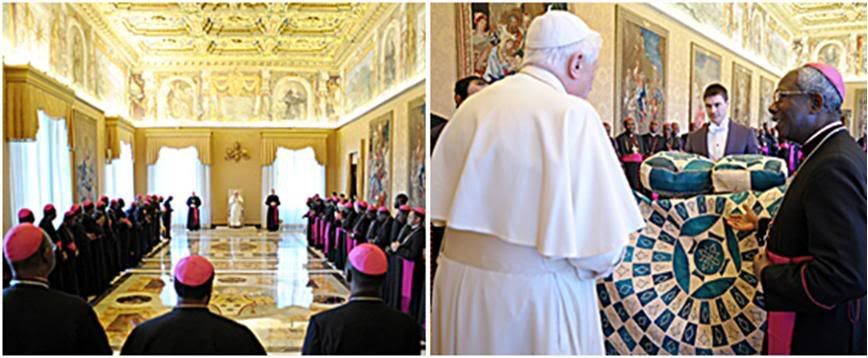
The Holy Father met with them in four separate grouyps in teh past week, but this morning, at the Consistory Hall of the Apostolic papalce, he addressed the entire delegation of Nigerian Bishops who are making their ad-limina visit to Rome this year. He spoke in English, as follows:
Dear Brother Bishops,
It is with great joy that I welcome you, the Bishops of Nigeria, on your Ad Limina visit to the tombs of the Apostles Peter and Paul. As the Successor of Peter I cherish this encounter which strengthens our bond of communion and fraternal love and allows us to renew together the sacred responsibility which we exercise in the Church.
I thank Archbishop Job for the kind words which he addressed to me on your behalf. For my part, I am pleased to express my sentiments of respect and gratitude to you and to all the faithful of Nigeria.
Brothers, since your last Ad Limina visit Almighty God has blessed the Church in your country with generous growth. This is especially visible in the number of new Christians who have received Christ into their hearts and accept joyfully the Church as "the pillar and bulwark of the truth" (1 Tim 3:15). The abundant priestly and religious vocations are also a clear sign of the work of the Spirit among you.
For these graces I give thanks to God and express my appreciation to you and to the priests, religious and catechists who have laboured in the Lord’s vineyard.
Expansion in the Church calls for special care in diocesan planning and the training of personnel through ongoing activities of formation in order to facilitate the necessary deepening of the faith of your people (cf. Ecclesia in Africa, 76).
From your reports I see that you are well aware of the basic steps involved: teaching the art of prayer, encouraging participation in the liturgy and the sacraments, wise and relevant preaching, catechetical instruction, and spiritual and moral guidance.
From this foundation faith flourishes in Christian virtue, and gives rise to vibrant parishes and generous service to the wider community. You yourselves, together with your priests must lead by humility, detachment from worldly ambitions, prayer, obedience to the will of God and transparency in governance. In this way you become a sign of Christ the Good Shepherd.
The celebration of the liturgy is a privileged source of renewal in Christian living. I commend you in your efforts to maintain the proper balance between moments of contemplation and external gestures of participation and joy in the Lord.
To this end attention must be given to the liturgical formation of priests and the avoidance of extraneous excesses. Continue on this path keeping in mind that the dialogue of love and veneration of the Lord is greatly enhanced by the practice of eucharistic adoration in parishes, religious communities and other suitable places (cf. Sacramentum Caritatis, 67).
The coming Synod of Bishops for Africa will address among other themes the topic of ethnic unrest. The marvellous image of the Heavenly Jerusalem, the gathering of innumerable men and women from every tribe and tongue and people and nation who have been ransomed by the blood of Christ (cf. Rev 5:9), encourages you to confront the challenge of ethnic conflict wherever present, even within the Church.
I express my appreciation to those of you who have accepted a pastoral mission outside the limits of your own regional or linguistic group and I thank the priests and people who have welcomed and supported you. Your readiness to adapt to others is an eloquent sign that, as the new family of all who believe in Christ (cf. Mk 3:31-35) there is no place in the Church for any kind of division.
Catechumens and neophytes must be taught to accept this truth as they make their commitment to Christ and to a life of Christian love. All believers, especially seminarians and priests, will grow in maturity and generosity by allowing the Gospel message to purify and overcome any possible narrowness of local perspectives.
Wise and discerning selection of seminarians is vital to the spiritual well-being of your country. Their personal formation must be assured through regular spiritual direction, sacramental reconciliation, prayer and meditation on Sacred Scripture.
In the word of God seminarians and priests will find the values that distinguish the good priest who is consecrated to the Lord in body and spirit (cf. 1 Cor 7:34). They will learn to serve with personal detachment and pastoral charity those entrusted to their care, strong in the grace that is in Christ Jesus (cf. 2 Tim 2:1).
I would like to highlight the Bishop’s task of sustaining the important social and ecclesial reality of marriage and family life. With the cooperation of well prepared priests and lay people, experts and married couples, you will exercise with responsibility and zeal your solicitude in this area of pastoral priority (cf. Familiaris Consortio, 73).
Courses for engaged couples, and general and specific catechetical teaching on the value of human life, marriage and the family will strengthen your faithful people for the challenges presented to them by changes in society. Likewise do not fail to encourage associations or movements that validly assist married couples in living their faith and marriage commitments.
As an important service to the nation, you have shown your commitment to interreligious dialogue especially with Islam, where with patience and perseverance, strong relations of respect, friendship and practical cooperation are being forged with other religious people.
Through your efforts as diligent and untiring promoters of goodwill, the Church will become a clearer sign and instrument of communion with God and of the unity of the whole human race (cf. Lumen Gentium, 1).
Your dedication to derive from Catholic principles enlightened comments on current national problems is greatly appreciated. The natural law, inscribed by the Creator on the heart of every human being (cf. World Day of Peace Message 2009, 8), and the Gospel, properly understood and applied to civic and political realities, do not in any way reduce the range of valid political options.
On the contrary, they constitute a guarantee offered to all citizens of a life of freedom, with respect for their dignity as persons, and protection from ideological manipulation and abuse based on the law of the strongest (cf. Address to the Plenary Session of the International Theological Commission, 5 December 2008).
With confidence in the Lord, continue to exercise your Episcopal authority in the struggle against unjust practices and corruption and against all causes and forms of discrimination and criminality, especially the degrading treatment of women and the deplorable practice of kidnapping.
By promoting Catholic Social Doctrine you offer your loyal contribution to your country and assist in the consolidation of a national order based on solidarity and a culture of human rights.
My dear Brother Bishops, I exhort you with the words of the Apostle Paul: "be watchful, stand firm in your faith, be courageous, be strong; let all that you do be done in love" (1 Cor 16:13-14).
Please convey my greetings to your beloved people, especially to those many believers who bear witness to Christ in hope through prayer and suffering (cf. Spe Salvi, 35 and 36).
My warm affection goes also to those who serve in the family, in parishes and mission stations, in education, health care and other spheres of Christian charity.
Commending you and those entrusted to your pastoral care to the prayers of Blessed Cyprian Michael Iwene Tansi and to the maternal protection of Mary, Mother of the Church, I cordially impart my Apostolic Blessing.
[Modificato da TERESA BENEDETTA 15/02/2009 02:26] |
 14/02/2009 18:15 14/02/2009 18:15 |
|
| | | OFFLINE | | Post: 16.593 | Registrato il: 28/08/2005
| Utente Gold | |
|
 Mons. Marini satisfied with
Mons. Marini satisfied with
preparations for Pope's visit

LUANDA, Feb. 13 (Adapted from Angop) – The work of preparation for Pope Benedict XVI's visit to Angola, scheduled for March 20-23 this year, is progreesing well, with the cooperation between the Angolan government and the Catholic Church, a Vatican representative said Thursday.
Mons. Guido Marini, head of papal liturgical celebrations, spoke to ANGOP after visiting the sites where the Pope will celebrate Mass and other liturgies, saying preparations are at an advanced stage.
"I came here with my collaborators in preparation for the Holy Father's visit and I now have a good overview of what is being done", he said.
Mons. Marini visited Cimangola square, São Paulo and Santo António parishes and Coqueiros stadium, places where the Pope will officiate at religious ceremonies.
At São Paulo Parish, the Brazilian civil engineering firm of Odebrecht has been fixing the walls of the cathedral, repainting statues, and rehabilitating the pavements and road in front of the church. Odebrecht is also in charge of preparing Cimangola Square for a scheduled open-air Papal Mass.
Pope Benedict XVI is expected in Luanda on March 20, coming from Cameroon, and will be received at Luanda's 4 de Fevreiro International Airport by religious entities, diplomats and politicians.
 More open talk now of
More open talk now of
Pope's Holy Land visit
By Ruth Ellen Gruber ·

ROME, Feb. 13 (JTA) -- Vatican officials are planning Pope Benedict XVI's spring trip to Israel, Jordan and the West Bank.
Monsignor Antonio Franco, the papal nuncio in Israel, told the Catholic news service SIR that the trip will be primarily "a pastoral visit" to local Catholic communities. This, however, did not exclude meetings with Israeli, Jordanian and Palestinian political leaders.
In an interview with SIR published Friday, Franco said the focus of the trip would be "peace and reconciliation." So far, he said, there were no plans for the Pope to try to visit Gaza.
He said the Pope will celebrate three public Masses, in Jerusalem, Bethlehem and the Galilee. The Pope will also "meet leaders of other Christian denominations" as well and local Jewish and Muslim leaders, he said.
The Pope himself gave the first public confirmation of such a trip during his meeting Thursday at the Vatican with a delegation from the Conference of Presidents of Major American Jewish Organizations.
No details on dates or schedule have been released, but various sources say the trip will take place in May.
Forum members will recall, of course. that on February 9, the usually reliable Andrea Tornielli wrote an advance story that describes the highlights of the Pope's proposed program in the Holy Land.
[Modificato da TERESA BENEDETTA 15/02/2009 23:08] |
 14/02/2009 22:18 14/02/2009 22:18 |
|
| | | OFFLINE | Post: 63 | Registrato il: 21/10/2008
| Utente Junior | |
|
a very good article from our bishop, Mgr Barbarin on the website of our diocese. Sorry, it is in french
It is here
|
 14/02/2009 22:20 14/02/2009 22:20 |
|
| | | OFFLINE | Post: 64 | Registrato il: 21/10/2008
| Utente Junior | |
|
oups
[URL=]http://lyon.catholique.fr/ |
 14/02/2009 23:36 14/02/2009 23:36 |
|
| | | OFFLINE | | Post: 16.597 | Registrato il: 28/08/2005
| Utente Gold | |
|
 Here you are, Flo, and thanks for the link. It's indeed a very good presentation of the situation.
The Pope holds out his hand:
Here you are, Flo, and thanks for the link. It's indeed a very good presentation of the situation.
The Pope holds out his hand:
He awaits a response
by Cardinal PHILIPPE BARBARIN
Archbishop of Lyon
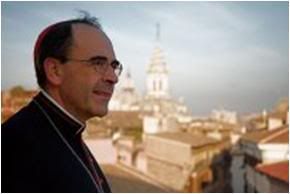 Translated from the site of the Archdiocese of Lyon
Translated from the site of the Archdiocese of Lyon

These past few weeks, the lifting of the excommunication from the bishops of the Priestly Fraternity of St. Pius X has caused a lot of uproar, above all because of the revolting statements by Mons. Williamson on the genocide of the Jews during the Second World War.
About this, the bishops of France immediately issued a statement that they are scandalized by his ideas, as are the Jewish community and all of society.
One must note that Mons. Fellay, the superior general of the FSSPX, has begged pardon from the Pope and all those who have been hurt by the statements of his colleague, whom he relieved of his duties as director of an FSSPX seminary in Argentina. But Williamson himself has not made the retraction that Pope Benedict has asked him to.
In 1988, Mons. Lefebvre consecrated four bishops despite the fact that John Paul II had specifically prohibited him from doing so. The entire night of June 29-30, 1988, a car was waiting outside the FSSPX seminary of Econe in Switzerland to give Mons. Lefebvre a chance to leave so he would not commit an offense that would incur automatic excommunication.
Many faithful at the time [after the illegal ordinations] dissociated themselves from Mons. Lefebvre's 'integriste' (traditionalist) movement to stay in communion with Rome. In Lyon, Cardinal Decourtray placed the St. Georges church at their disposition.
Since the Motu Proprio of summer 2007, as indicated by Pope Benedict XVI, three priests of the Priestly Fraternity of St. Peter and three diocesan priests have been celebrating the Mass according to 'the extraordinary form of the Roman rite' in Lyon and in other places within the diocese.
I have entrusted to them the pastoral responsibility for the faithful who are attached to this form of the liturgy, and they report to me on their mission.
There is also the St. Irenee Priory situated between Lyon and Villeurbanne which is served by priests of the FSSPX. They have asked to see me from time to time, and our conversations have been cordial.
They assure me that they pray for the Pope and the (local) Bishop in the Canon of the Mass. They made a pilgrimage to Fourviere [Lyon's Basilica of Notre Dame] on December 8 where they were respectfully welcomed by the rector of the Basilica. But they have not received a mission from the bishop, and are not under obeisance nor in communion with the Pope or with me.
Right after his election, Benedict XVI stated his desire for concrete actions towards the unity of the Church, particularly in the ecumenical domain. Alerted by history, he knows that if generations are allowed to pass after a rupture like that with the FSSPX, the abyss would become insuperable. One merely has to think of our relations with the Orthodox Churches.
The mutual excommunications of 1054 were not lifted until 1965 by Pope Paul VI and Patriarch Athenagoras, and after more than 40 years, Catholics and Orthodox consider each other brothers, dialog is pursued... but full communion has not been achieved.
That is why the Pope has acted without further delay [20 years since Mons. Lefebvre's schismatic act].
Now, the conditions are present for a discussion on basic differences to take place. The question to the four bishops is simple: Do you recognize with good faith the Magisterium of the Church, particularly that of the past 50 years, namely the teachings of Vatican-II and those of the Popes since John XXIII?
Shortly after the excommunications were lifted. the Grand Rabbi of France, Gilles Berheim - who throughout this sad episode, has shown great respect for the Pope and the Catholic community in France - asked for a clear response to two questions that have concerned him:
1 - If these four bishops do not accept the teaching of Nostra aetate, the conciliar declaration on inter-religious dialog, will they be re-integrated into the Church? The answer is obvious: No! And this has been confirmed by the Vatican.
2 - Was the Pope aware of Mons. Williamson's statements and his negation of the Shoah at the time the decree was signed? The note from the Secretariat of State said No to this question, which is also our answer.
The Holy Father's intention is clear. He is carrying out his mission: that of being the Rock of unity in the Church and of confirming his brothers in the faith (cf Lk 22,31).
Certainly, there were mistakes in internal coordination and external communication in this matter. Unfortunately, they have only aggravated the actions that are being taken to have his initiative fail and to provoke public scandal.
But the Pope, in holding out his hand to the four bishops, awaits a response to his gesture of reconciliation. In order to be able to re-integrate them into the Church and entrust them with a ministry, he requires their full adherence to the Magisterium of the Church. And we expect that the great majority of their faithful will follow suit.
It was for this intention that I was happy to be able to pray at the tomb of the Apostle Peter in recent days. I invite the Catholics of our diocese to entrust this intention to the mercy of God, for whom everything is possible, and I also ask them to pray for our brothers and sisters in the other Christian confessions with whom we are ardently working for unity.
They are as committed as we are to Jesus's prayer for his disciples: "That they may be one, so that the world may believe" (Jn 17.21) and to the commentary that the Lord himself made on the new commandment: "This is how all will know that you are my disciples, if you have love for one another" (Jn 13,35).
Philippe Card. Barbarin
13 February 2009
[Modificato da TERESA BENEDETTA 14/02/2009 23:37] |
 15/02/2009 02:24 15/02/2009 02:24 |
|
| | | OFFLINE | | Post: 16.599 | Registrato il: 28/08/2005
| Utente Gold | |
|
 On the 80th anniversary of
On the 80th anniversary of
the Lateran Pacts and Vatican State:
BENEDICT XVI PAYS TRIBUTE to
THE PONTIFICATE OF PIUS XI
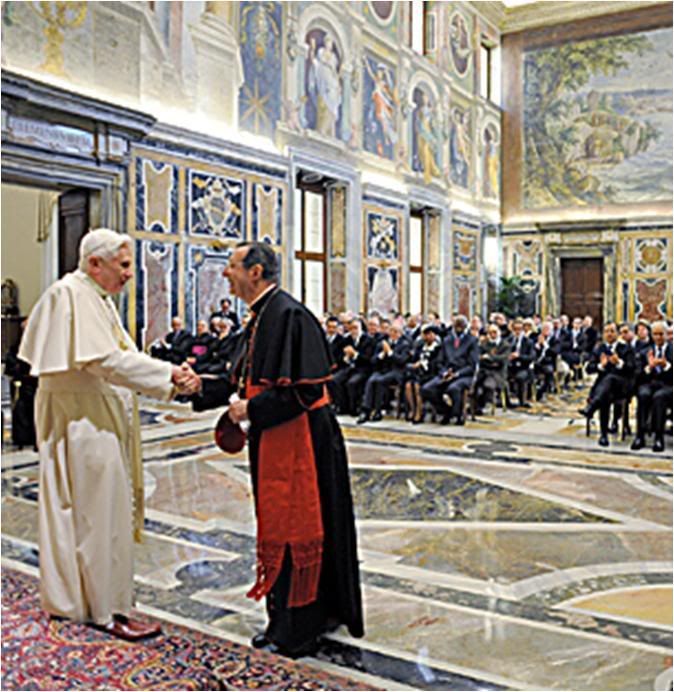 The Pope thanks Cardinal Lajolo, Governor fo Vatican City State, for his greeting.
The Pope thanks Cardinal Lajolo, Governor fo Vatican City State, for his greeting.
The Holy Father concluded the week marking the observance of the 80th anniversary of Vatican City State Saturday morning by addressing participants of a study conference devoted to examining the significance of statehood for the Holy See.
He paid high tribute to Pius XI, 'the Pope of my childhood', for his vision and efforts towards concluding the Lateran Pacts with the State of Italy, and the great work of his Pontificate in the difficult years between the two world wars.
Here is a translation of his address.
Eminent Cardinals,
Venerated brothers in the Episcopate and Priesthood,
Ladies and gentlemen!
It is with great pleasure that I address my most heartfelt greeting to all of you - organizers, moderators and participants in the study conference held this week to celebrate the 80th anniversary of the foundation of Vatican City State.
"A small territory for a great mission" is the topic on which you have given your attention, reflecting on the spiritual and civic values that this tiny sovereign state embodies, entirely in the service of the great mission entrusted by Jesus Christ to the Apostle Peter and his Successors.
I thank Cardinal Giovanni Lajolo not only for the greeting that he addressed to me on your behalf, but for the initiatives that he and his co-workers in the Governatorate have made to solemnize this significant occasion to mark 80 years of the existence and activities of Vatican state.
I can only express great satisfaction for the celebrations and the various commemorative initiatives these days which are designed to examine deeply and make better known the history and the profile of Civitas Vaticana.
Eighty years since it was founded, Vatican City State represents a reality that was peacefully acquired, even if its raison d'etre has not always been well understood nor the multiple tasks that it is called on to carry out.
For those who work daily in the service of the Holy See and those who live in the city, it is taken for granted that a tiny sovereign state exists in the heart of Rome. But not everyone is aware that it is the outcome of a somewhat tormented historical process that made its creation possible, motivated by high ideals of faith and a far-seeing realization of the ends which it should satisfy.
We can thus say that the observance which is the reason for our meeting today invites us to look with greater awareness at what Vatican City State stands for and is.
If we look back to February 11, 1929, we cannot fail to feel profound acknowledgment and gratitude to the one who was the first and principal craftsman and protagonist of the Lateran Pacts, my venerated predecessor Pius XI. He was the Pope of my childhood, whom we regarded with such veneration and love.
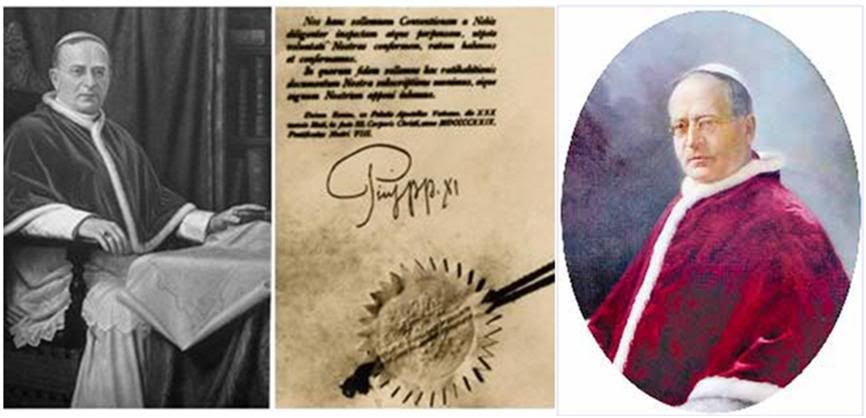
Rightly, his name has resounded several times these days because it was he, with his lucid farsightedness and indomitable will, who was the true founder and prime constructor of the State of Vatican City.
Moreover, the studies that are still under way about his Pontificate have made us perceive even more the greatness of Papa Ratti, who led the Church in the difficult years between the two world wars.
With a firm hand, he gave a strong push to ecclesiastical activity in its multiple dimensions, such as missionary expansion, attention to the formation of ministers of God, the promotion of activities by lay faithful in the Church and in society, and an intense relationship with the civilian community.
During his Pontificate, the librarian Pope had to take on the difficulties and persecutions that the Church was undergoing in countries like Mexico and Spain, and the battle that she was waging against totalitarianisms - national socialism and fascism - that had emerged and consolidated themselves in those years.
Germany will not forget his great encyclical Mit brennender Sorge as a strong signal against Nazism. Indeed one can only be truly admiring when looking at the wise and strong work of this Pontiff, who wanted for the Church only the freedom that would allow it to carry out its mission integrally.
Vatican City State, which was born as a consequence of the Lateran pacts, particularly of the Lateran Treaty, was considered by Pius XI as an instrument that would guarantee the necessary independence required by every human authority, in order to give the Church and its Supreme Pastor the possibility of complying fully with the mandate received from Christ the Lord.
Indeed how useful and beneficial this tiny but completely statal reality turned out to be, for the Holy See and for the Church, as well as for Rome and the entire world, became apparent barely ten years later when the Second World War erupted, a war that brought its violence and sufferings to the very doors of the Vatican.
We can therefore say that through the eight decades of its existence, Vatican state has shown itself to be a ductile instrument that has always been up to the demands placed on it - and that continue to be placed - by the mission of the Pope, by the needs of the Church, and by the ever-changeable conditions of society.
Because of this, under the leadership of my venerated predecessors - from the Servant of God Pius XII to Pope John Paul II - a constant adaptation of the norms, the structures and the means of this singular state built around the Tomb of Peter has taken place and continues to take place under the eyes of everyone.
The significant anniversary which we commemorate these days is therefore reason for profound thanks to the Lord who guides the destinies of his Church in the often turbulent events in the sea of history, and who assists his Vicar on earth in carrying out his office of Christianae religionis summus Antistes [supreme head of the Christian religion].
My gratitude extends to those who have been protagnists in the past and today in the life of Vatican City State, some of them famous, many anonymous in their humble but precious service.
My grateful thoughts go also to the members of the present community that lives and works in the Governatorate and the other structures of the state, in the name as well of the entire people of God.
At the same time, I wish to encourage those who work in heh different Vatican offices and services to carry out their tasks not only with honesty and professional competence but also with an ever greater awareness that their work constitutes a precious service to the cause of the Kingdom of God.
The Civitas Vaticana is really an almost invisible point on the map of world geography, a minute and defenseless state without any armies, and apparently irrelevant in the great international geopolitical strategies.
And yet, this visible presidium of the Holy See's absolute independence has been and is the center that radiates constant activity in favor of solidarity and the common good. And is it not perhaps precisely because of this that great attention is given to this tiny strip of land?
Vatican state, which contains treasures of faith, of history, of art, is the custodian of a patrimony that is precious for all mankind. From its heart, where the Pope lives near the Tomb of Peter, there arises an unceasing message of true social peace, of hope, of reconciliation and peace.
And now, our State, after having solemnly marked the 80th anniversary of its foundation, continues its journey with stronger apostolic impetus. May Vatican City State be ever more a true 'city on a hill', made luminous by the convictions and generous dedication of all those who work in the service of the ecclesial mission of the Successor of Peter.
With this wish, I invoke the maternal protection of Mary, the intercession of Saints Peter and Paul and the other martyrs who have hallowed this ground with their blood, as I gladly impart my blessing on all of you present here, extending it with affection to the great family of Vatican City State.
Signing of the Latrean Pacts: Benito Mussolini, top right photo, signed for Italy's King Vittorio Emanuele,
and Cardinal Gasparri, Vatican Secretary of State, signed for Pius XI.
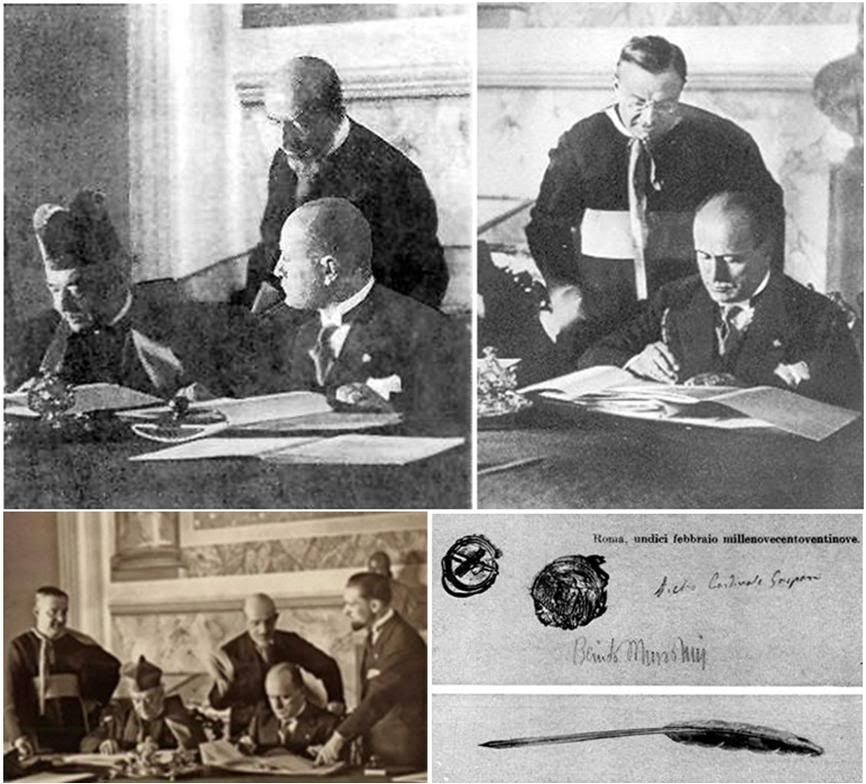 Stamp set issued by the Vatican to mark its 80th anniversary as a state:
Stamp set issued by the Vatican to mark its 80th anniversary as a state:
 From left, Pius XI, Pius XII, John XXIII, Paul VI, John Paul, I, John Paul II, and Benedict XVI.
The English text of the Lateran Pacts of 1929 and the amendment that modfied it in 1985 may be found on
www.hol.com/~mikesch/treaty.htm
From left, Pius XI, Pius XII, John XXIII, Paul VI, John Paul, I, John Paul II, and Benedict XVI.
The English text of the Lateran Pacts of 1929 and the amendment that modfied it in 1985 may be found on
www.hol.com/~mikesch/treaty.htm
[Modificato da TERESA BENEDETTA 15/02/2009 02:58] |
 15/02/2009 14:55 15/02/2009 14:55 |
|
| | | OFFLINE | | Post: 16.601 | Registrato il: 28/08/2005
| Utente Gold | |
|

February 15
St. Claude La Colombriere
OR today/
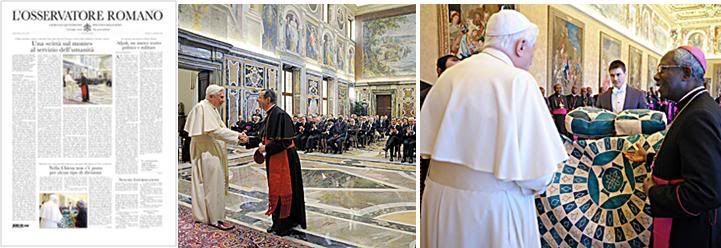
On the 80th anniversary of Vatican City State, Benedict XVI
underscores its work to promote solidarity and the common good:
'A city on the hill in the service of mankind'
Other Page 1 stories: The Pope tells the bishops of Nigeria there is no place for any type of division in the Church;
and the United States factors in Afpak (Afghanistan-Pakistan) into a new strategy for the Middle East.
THE POPE'S DAY
Angelus today - The Holy Father has a mini-homily on Jesus healing a leper from today's Gospel.
|
 15/02/2009 15:21 15/02/2009 15:21 |
|
| | | OFFLINE | | Post: 16.602 | Registrato il: 28/08/2005
| Utente Gold | |
|
 ANGELUS TODAY
ANGELUS TODAY
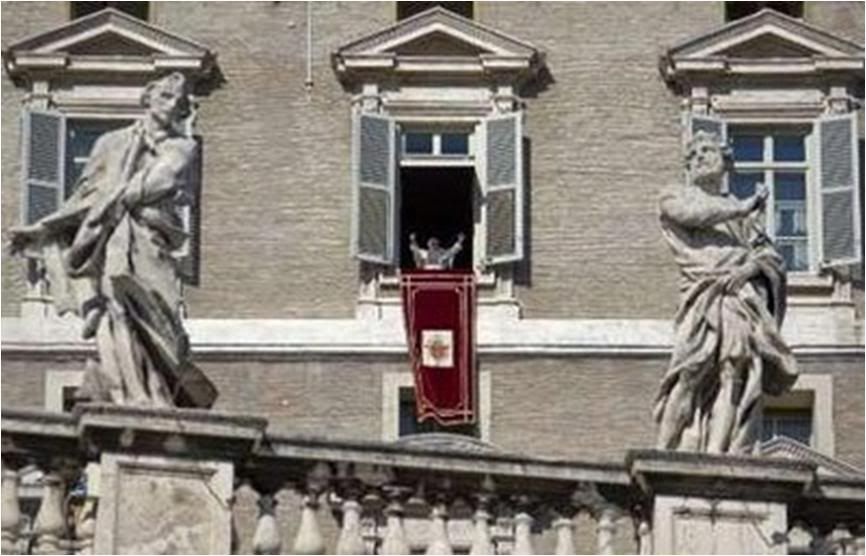
Here is a full translation of the Holy Father's words:
Dear brothers and sisters!
In the Sunday Gospels at this time, the evangelist St. Mark offers a series of miraculous healings by Jesus for our reflection.
Today, we are presented with a singular case, a leper who was cured (cfr Mk 1, 4045) after approaching Jesus and imploring on his knees: "If you wish, you can make me clean".
Moved with pity, Jesus stretched out his hand, touched him, and said to him, "I do will it. Be made clean."
And instantly, the man was healed, and Jesus asked him not to tell anybody, but to present himself to a priest to offer the sacrifice prescribed by Mosaic law.
But the cured leper could not keep silent about it, and proclaimed to everyone what had happened to him.
As a result, the evangelist tells us, even more sick people came to Jesus from everywhere, finally forcing him to stay away from towns in order not to be assailed by crowds.
Jesus told the leper, "Be made clean". According to ancient Jewish law (cfr Lv 13-14), leprosy was considered not just a disease but also the gravest form of 'impurity'.
It was the duty of the priests to diagnose it and declare the sick person unclean, who must then keep apart from the community and live away from inhabited places until any eventual certified healing.
Leprosy therefore constituted a kind of religious and civilian death, and its healing a kind of resurrection. We can see in leprosy a symbol for sin, which is the true impurity of the heart, one able to keep us away from God.
It is not the physical ailment of leprosy, as the old laws saw it, that separates us from him, but sin, the spiritual and moral evil.
That is why the Psalmist exclaims: "Happy the sinner whose fault is removed, whose sin is forgiven" and then, addressing God, "I declared my sin to you; my guilt I did not hide. I said, 'I confess my faults to the LORD', and you took away the guilt of my sin" (Ps 31/32, 1.5).
The sins we commit keep us away from God, and if they are not humbly confessed, with confidence in divine mercy, they can even come to produce the death of the soul.
Thus this miracle [in Mark's Gospel] takes on a strong symbolic value. Jesus, as Isaiah had prophesied, is the Servant of the Lord who "bore our infirmities and endured our sufferings" (cfr Is 53,4).
In his passion, he would become like the leper, made unclean by our sins, separated from God: and all this he would do out of love, in order to obtain reconciliation, forgiveness and salvation for us.
In the Sacrament of Penance, the crucified and resurrected Christ, through his ministers, purifies us with his infinite mercy, restores us to communion with the heavenly Father and with our brothers, makes us a gift of his love, his joy and his peace.
Dear brothers and sisters, let us invoke the Virgin Mary, whom God preserved from every stain of sin, so that she may help us avoid sin and make frequent use of the Sacrament of Confession, the sacrament of forgiveness, which today more than ever must be rediscovered for its value and its importance in our life as Christians.
In English, he said:
I greet all the English-speaking visitors and pilgrims here today for the Angelus, especially the members of the joint Catholic-Orthodox pilgrimage from Finland.
I pray that the time you spend in Rome may deepen your love for Jesus Christ our Lord, and for his Church. In this Sunday’s Gospel, we hear how Jesus healed a leper who came to him and pleaded to be cured.
To those who turn to him today, Jesus continues to offer healing and strength. I encourage all of you to place your trust in him, and to bring before him your hopes and your needs, for yourselves and for your loved ones.
May the Lord grant your prayers and pour out upon all of you his abundant blessings.
Unusually, he had a different message for German- and Spanish-speaking pilgrims. whom he urged to follow the exhortation of the Apostle Paul "to do everything for the glory of God and the good of others - more than one's self- interest - following the example of Christ."
His full message in German:
In the second reading this Sunday, St. Paul tells us: "I try to please everyone in every way, not seeking my own benefit but that of the many, that they may be saved" (1 Cor 10,33).
The apostle invites us to imitate him in this attitude. The selfless readiness to help our neighbor should radiate from the center of our heart because in this way, we accept the loving action of God upon us.
That is my duty as a pastor, and I ask you with your prayers and through your good works to sustain me in this service. May the Lord bless you and your loved ones.
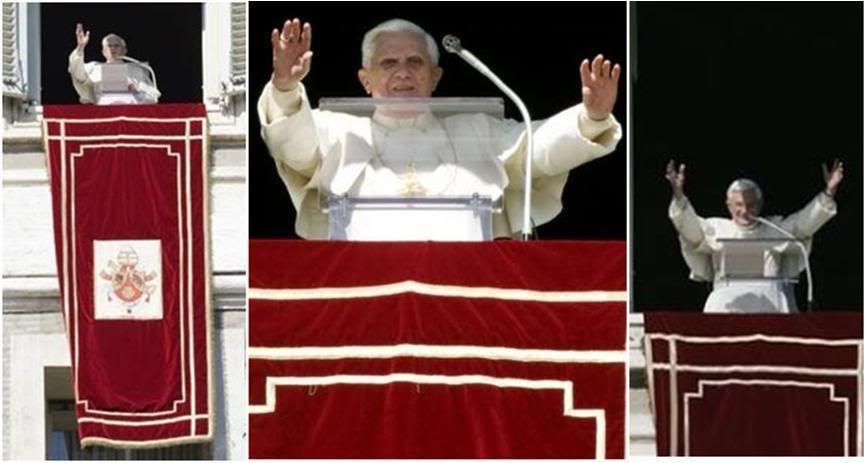
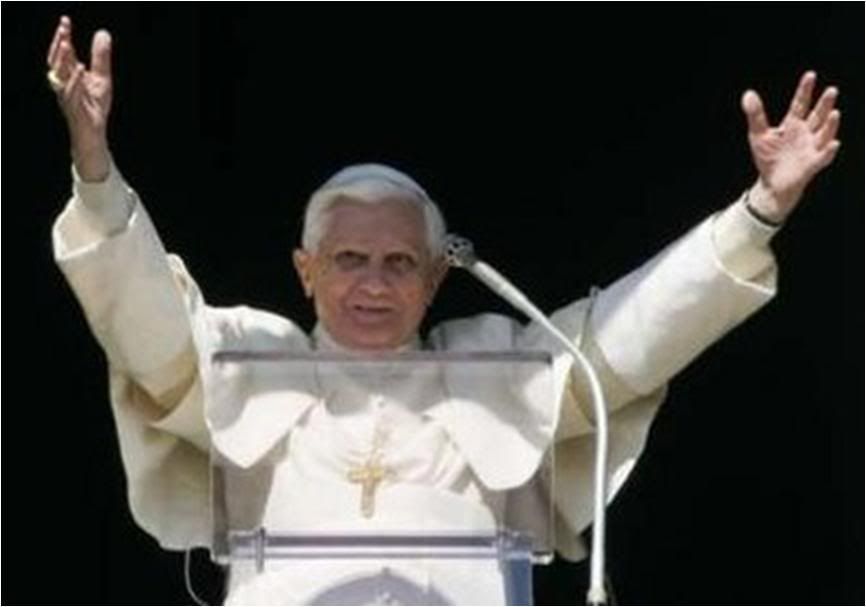
[Modificato da TERESA BENEDETTA 15/02/2009 22:54] |
|
|
|
|